Entrepreneurship and Small Business Management: A Comprehensive Analysis
VerifiedAdded on 2024/05/21
|29
|5421
|89
AI Summary
This report provides a comprehensive analysis of entrepreneurship and small business management, exploring various types of entrepreneurial ventures, their impact on the economy, and the characteristics of successful entrepreneurs. It examines the differences between private and public sector entrepreneurship, the role of small, medium, and large businesses in economic growth, and the influence of personal background on entrepreneurial success. The report also delves into the importance of entrepreneurial mindset and motivation, highlighting the key traits and skills that contribute to entrepreneurial success.
Contribute Materials
Your contribution can guide someone’s learning journey. Share your
documents today.

ENTREPRENEURSHIP AND
SMALL BUSINESS
MANAGEMENT
SMALL BUSINESS
MANAGEMENT
Secure Best Marks with AI Grader
Need help grading? Try our AI Grader for instant feedback on your assignments.
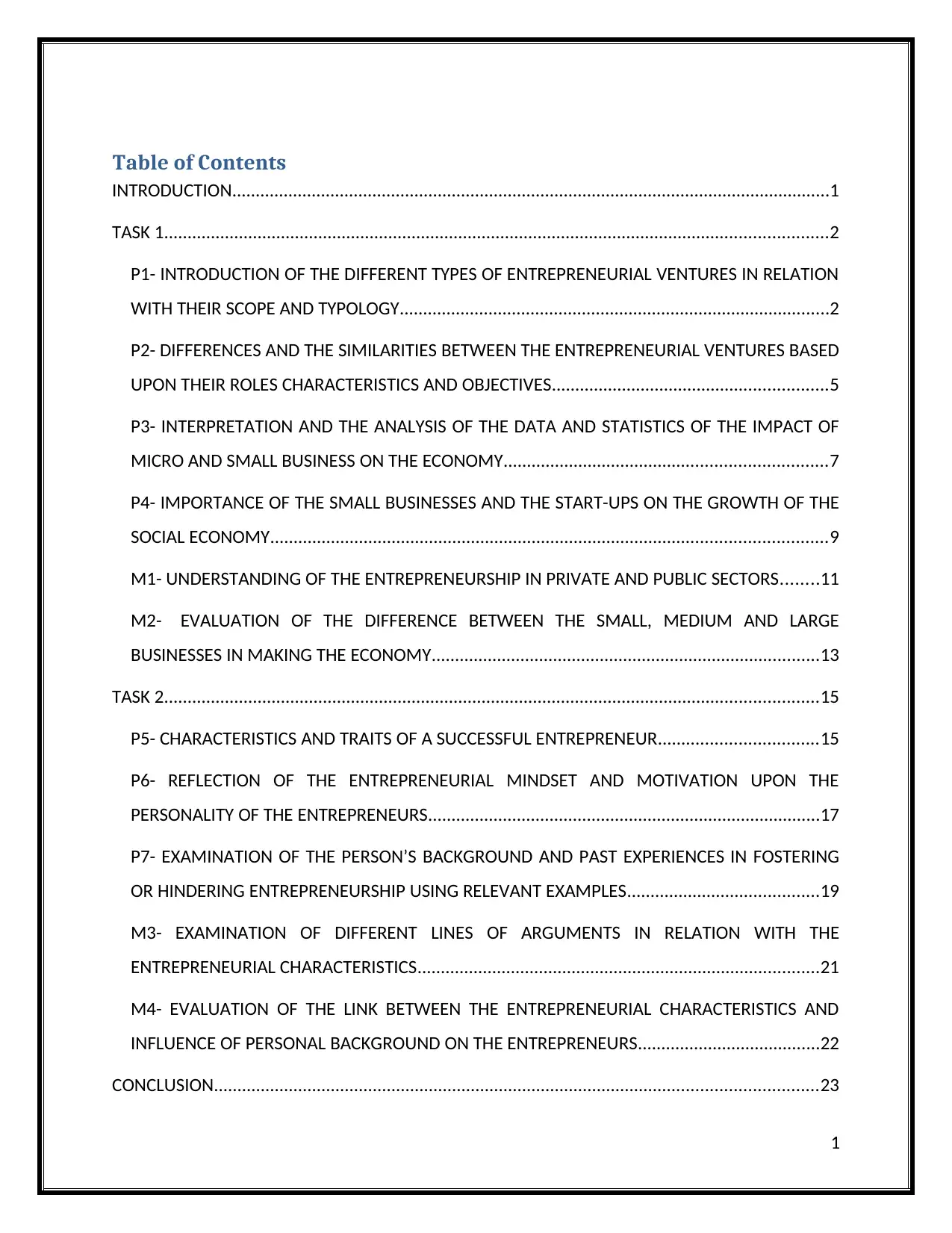
Table of Contents
INTRODUCTION................................................................................................................................1
TASK 1..............................................................................................................................................2
P1- INTRODUCTION OF THE DIFFERENT TYPES OF ENTREPRENEURIAL VENTURES IN RELATION
WITH THEIR SCOPE AND TYPOLOGY............................................................................................2
P2- DIFFERENCES AND THE SIMILARITIES BETWEEN THE ENTREPRENEURIAL VENTURES BASED
UPON THEIR ROLES CHARACTERISTICS AND OBJECTIVES...........................................................5
P3- INTERPRETATION AND THE ANALYSIS OF THE DATA AND STATISTICS OF THE IMPACT OF
MICRO AND SMALL BUSINESS ON THE ECONOMY.....................................................................7
P4- IMPORTANCE OF THE SMALL BUSINESSES AND THE START-UPS ON THE GROWTH OF THE
SOCIAL ECONOMY.......................................................................................................................9
M1- UNDERSTANDING OF THE ENTREPRENEURSHIP IN PRIVATE AND PUBLIC SECTORS........11
M2- EVALUATION OF THE DIFFERENCE BETWEEN THE SMALL, MEDIUM AND LARGE
BUSINESSES IN MAKING THE ECONOMY...................................................................................13
TASK 2............................................................................................................................................15
P5- CHARACTERISTICS AND TRAITS OF A SUCCESSFUL ENTREPRENEUR..................................15
P6- REFLECTION OF THE ENTREPRENEURIAL MINDSET AND MOTIVATION UPON THE
PERSONALITY OF THE ENTREPRENEURS....................................................................................17
P7- EXAMINATION OF THE PERSON’S BACKGROUND AND PAST EXPERIENCES IN FOSTERING
OR HINDERING ENTREPRENEURSHIP USING RELEVANT EXAMPLES.........................................19
M3- EXAMINATION OF DIFFERENT LINES OF ARGUMENTS IN RELATION WITH THE
ENTREPRENEURIAL CHARACTERISTICS......................................................................................21
M4- EVALUATION OF THE LINK BETWEEN THE ENTREPRENEURIAL CHARACTERISTICS AND
INFLUENCE OF PERSONAL BACKGROUND ON THE ENTREPRENEURS.......................................22
CONCLUSION.................................................................................................................................23
1
INTRODUCTION................................................................................................................................1
TASK 1..............................................................................................................................................2
P1- INTRODUCTION OF THE DIFFERENT TYPES OF ENTREPRENEURIAL VENTURES IN RELATION
WITH THEIR SCOPE AND TYPOLOGY............................................................................................2
P2- DIFFERENCES AND THE SIMILARITIES BETWEEN THE ENTREPRENEURIAL VENTURES BASED
UPON THEIR ROLES CHARACTERISTICS AND OBJECTIVES...........................................................5
P3- INTERPRETATION AND THE ANALYSIS OF THE DATA AND STATISTICS OF THE IMPACT OF
MICRO AND SMALL BUSINESS ON THE ECONOMY.....................................................................7
P4- IMPORTANCE OF THE SMALL BUSINESSES AND THE START-UPS ON THE GROWTH OF THE
SOCIAL ECONOMY.......................................................................................................................9
M1- UNDERSTANDING OF THE ENTREPRENEURSHIP IN PRIVATE AND PUBLIC SECTORS........11
M2- EVALUATION OF THE DIFFERENCE BETWEEN THE SMALL, MEDIUM AND LARGE
BUSINESSES IN MAKING THE ECONOMY...................................................................................13
TASK 2............................................................................................................................................15
P5- CHARACTERISTICS AND TRAITS OF A SUCCESSFUL ENTREPRENEUR..................................15
P6- REFLECTION OF THE ENTREPRENEURIAL MINDSET AND MOTIVATION UPON THE
PERSONALITY OF THE ENTREPRENEURS....................................................................................17
P7- EXAMINATION OF THE PERSON’S BACKGROUND AND PAST EXPERIENCES IN FOSTERING
OR HINDERING ENTREPRENEURSHIP USING RELEVANT EXAMPLES.........................................19
M3- EXAMINATION OF DIFFERENT LINES OF ARGUMENTS IN RELATION WITH THE
ENTREPRENEURIAL CHARACTERISTICS......................................................................................21
M4- EVALUATION OF THE LINK BETWEEN THE ENTREPRENEURIAL CHARACTERISTICS AND
INFLUENCE OF PERSONAL BACKGROUND ON THE ENTREPRENEURS.......................................22
CONCLUSION.................................................................................................................................23
1
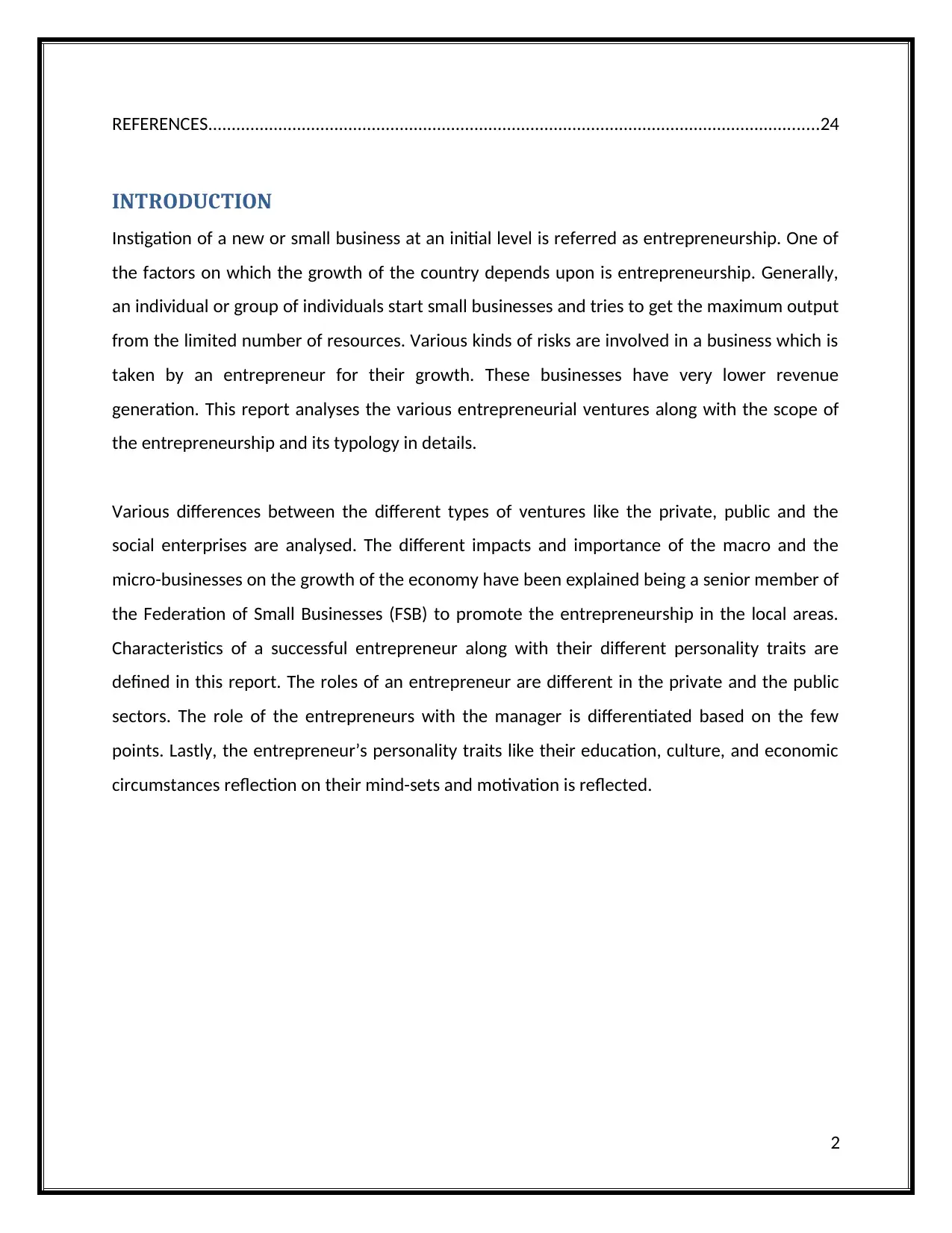
REFERENCES...................................................................................................................................24
INTRODUCTION
Instigation of a new or small business at an initial level is referred as entrepreneurship. One of
the factors on which the growth of the country depends upon is entrepreneurship. Generally,
an individual or group of individuals start small businesses and tries to get the maximum output
from the limited number of resources. Various kinds of risks are involved in a business which is
taken by an entrepreneur for their growth. These businesses have very lower revenue
generation. This report analyses the various entrepreneurial ventures along with the scope of
the entrepreneurship and its typology in details.
Various differences between the different types of ventures like the private, public and the
social enterprises are analysed. The different impacts and importance of the macro and the
micro-businesses on the growth of the economy have been explained being a senior member of
the Federation of Small Businesses (FSB) to promote the entrepreneurship in the local areas.
Characteristics of a successful entrepreneur along with their different personality traits are
defined in this report. The roles of an entrepreneur are different in the private and the public
sectors. The role of the entrepreneurs with the manager is differentiated based on the few
points. Lastly, the entrepreneur’s personality traits like their education, culture, and economic
circumstances reflection on their mind-sets and motivation is reflected.
2
INTRODUCTION
Instigation of a new or small business at an initial level is referred as entrepreneurship. One of
the factors on which the growth of the country depends upon is entrepreneurship. Generally,
an individual or group of individuals start small businesses and tries to get the maximum output
from the limited number of resources. Various kinds of risks are involved in a business which is
taken by an entrepreneur for their growth. These businesses have very lower revenue
generation. This report analyses the various entrepreneurial ventures along with the scope of
the entrepreneurship and its typology in details.
Various differences between the different types of ventures like the private, public and the
social enterprises are analysed. The different impacts and importance of the macro and the
micro-businesses on the growth of the economy have been explained being a senior member of
the Federation of Small Businesses (FSB) to promote the entrepreneurship in the local areas.
Characteristics of a successful entrepreneur along with their different personality traits are
defined in this report. The roles of an entrepreneur are different in the private and the public
sectors. The role of the entrepreneurs with the manager is differentiated based on the few
points. Lastly, the entrepreneur’s personality traits like their education, culture, and economic
circumstances reflection on their mind-sets and motivation is reflected.
2
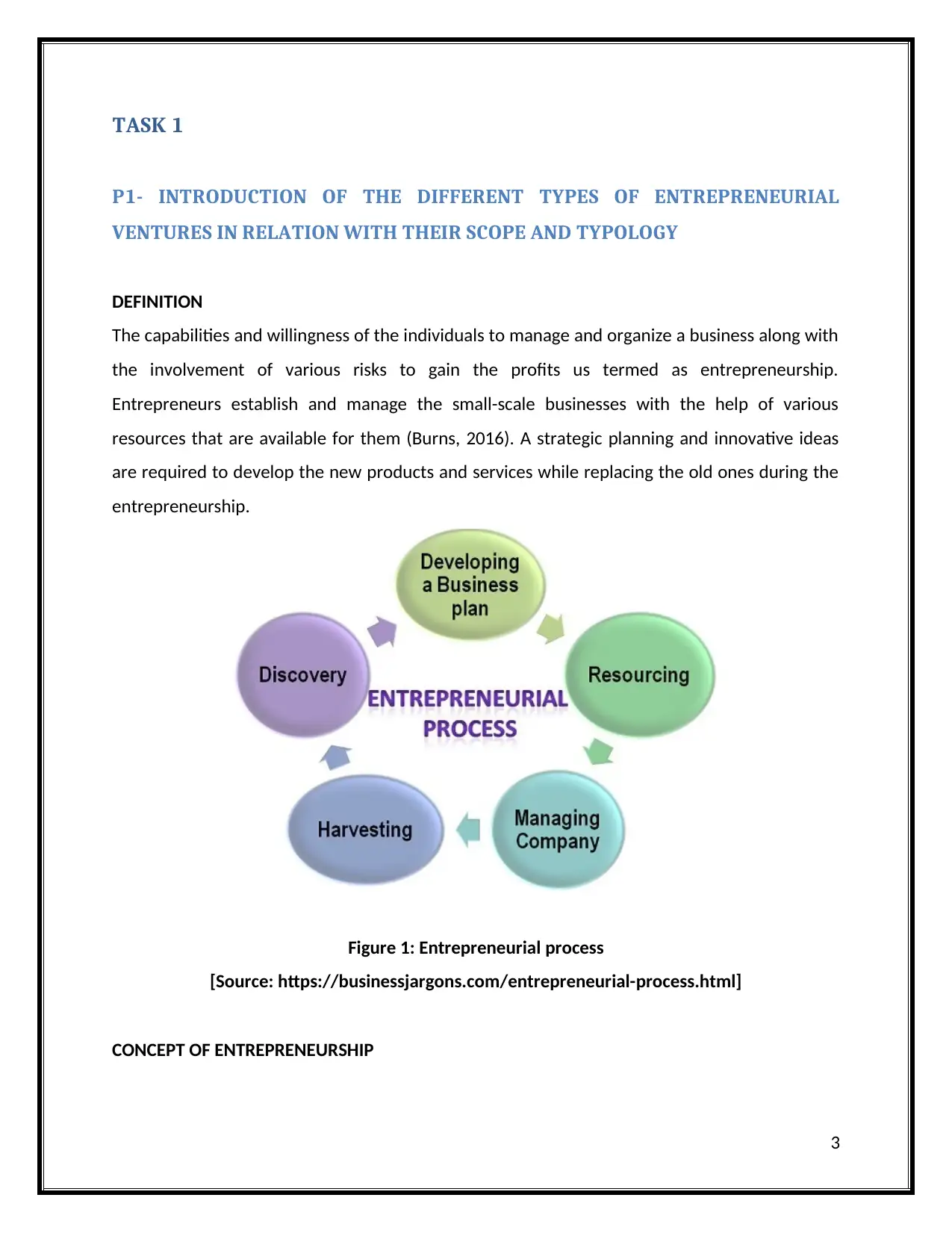
TASK 1
P1- INTRODUCTION OF THE DIFFERENT TYPES OF ENTREPRENEURIAL
VENTURES IN RELATION WITH THEIR SCOPE AND TYPOLOGY
DEFINITION
The capabilities and willingness of the individuals to manage and organize a business along with
the involvement of various risks to gain the profits us termed as entrepreneurship.
Entrepreneurs establish and manage the small-scale businesses with the help of various
resources that are available for them (Burns, 2016). A strategic planning and innovative ideas
are required to develop the new products and services while replacing the old ones during the
entrepreneurship.
Figure 1: Entrepreneurial process
[Source: https://businessjargons.com/entrepreneurial-process.html]
CONCEPT OF ENTREPRENEURSHIP
3
P1- INTRODUCTION OF THE DIFFERENT TYPES OF ENTREPRENEURIAL
VENTURES IN RELATION WITH THEIR SCOPE AND TYPOLOGY
DEFINITION
The capabilities and willingness of the individuals to manage and organize a business along with
the involvement of various risks to gain the profits us termed as entrepreneurship.
Entrepreneurs establish and manage the small-scale businesses with the help of various
resources that are available for them (Burns, 2016). A strategic planning and innovative ideas
are required to develop the new products and services while replacing the old ones during the
entrepreneurship.
Figure 1: Entrepreneurial process
[Source: https://businessjargons.com/entrepreneurial-process.html]
CONCEPT OF ENTREPRENEURSHIP
3
Secure Best Marks with AI Grader
Need help grading? Try our AI Grader for instant feedback on your assignments.
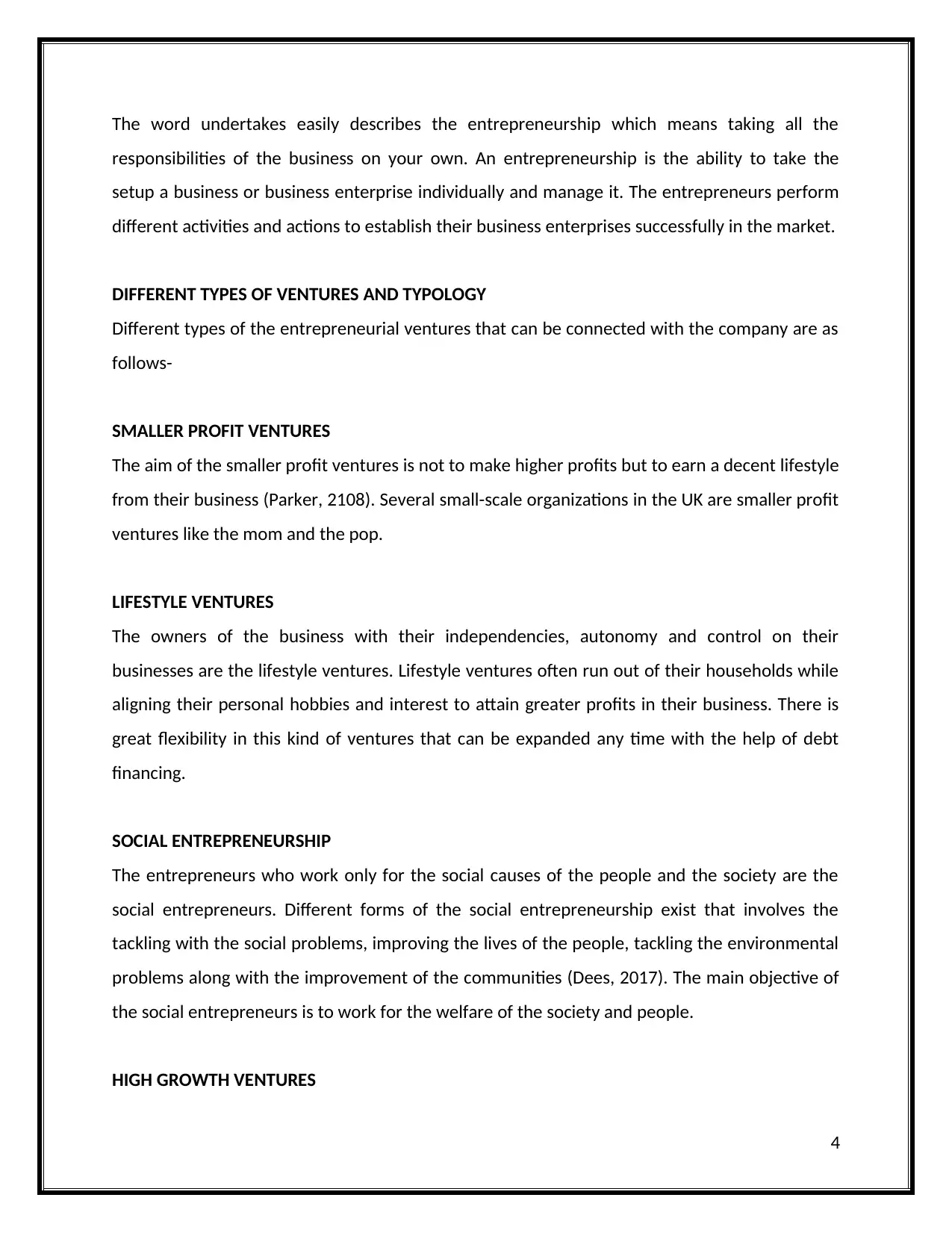
The word undertakes easily describes the entrepreneurship which means taking all the
responsibilities of the business on your own. An entrepreneurship is the ability to take the
setup a business or business enterprise individually and manage it. The entrepreneurs perform
different activities and actions to establish their business enterprises successfully in the market.
DIFFERENT TYPES OF VENTURES AND TYPOLOGY
Different types of the entrepreneurial ventures that can be connected with the company are as
follows-
SMALLER PROFIT VENTURES
The aim of the smaller profit ventures is not to make higher profits but to earn a decent lifestyle
from their business (Parker, 2108). Several small-scale organizations in the UK are smaller profit
ventures like the mom and the pop.
LIFESTYLE VENTURES
The owners of the business with their independencies, autonomy and control on their
businesses are the lifestyle ventures. Lifestyle ventures often run out of their households while
aligning their personal hobbies and interest to attain greater profits in their business. There is
great flexibility in this kind of ventures that can be expanded any time with the help of debt
financing.
SOCIAL ENTREPRENEURSHIP
The entrepreneurs who work only for the social causes of the people and the society are the
social entrepreneurs. Different forms of the social entrepreneurship exist that involves the
tackling with the social problems, improving the lives of the people, tackling the environmental
problems along with the improvement of the communities (Dees, 2017). The main objective of
the social entrepreneurs is to work for the welfare of the society and people.
HIGH GROWTH VENTURES
4
responsibilities of the business on your own. An entrepreneurship is the ability to take the
setup a business or business enterprise individually and manage it. The entrepreneurs perform
different activities and actions to establish their business enterprises successfully in the market.
DIFFERENT TYPES OF VENTURES AND TYPOLOGY
Different types of the entrepreneurial ventures that can be connected with the company are as
follows-
SMALLER PROFIT VENTURES
The aim of the smaller profit ventures is not to make higher profits but to earn a decent lifestyle
from their business (Parker, 2108). Several small-scale organizations in the UK are smaller profit
ventures like the mom and the pop.
LIFESTYLE VENTURES
The owners of the business with their independencies, autonomy and control on their
businesses are the lifestyle ventures. Lifestyle ventures often run out of their households while
aligning their personal hobbies and interest to attain greater profits in their business. There is
great flexibility in this kind of ventures that can be expanded any time with the help of debt
financing.
SOCIAL ENTREPRENEURSHIP
The entrepreneurs who work only for the social causes of the people and the society are the
social entrepreneurs. Different forms of the social entrepreneurship exist that involves the
tackling with the social problems, improving the lives of the people, tackling the environmental
problems along with the improvement of the communities (Dees, 2017). The main objective of
the social entrepreneurs is to work for the welfare of the society and people.
HIGH GROWTH VENTURES
4

Focusing on the various innovations to earn the maximum profits in the business is the main
objective of the high growth ventures. Indefinite growth in the business by pushing their
envelope is the focus of such ventures. In comparison to the lifestyle company, large numbers
of investors are attracted by such ventures. Industrial development is focused on the
companies by the development of the great products and services which also improves the
companies.
5
objective of the high growth ventures. Indefinite growth in the business by pushing their
envelope is the focus of such ventures. In comparison to the lifestyle company, large numbers
of investors are attracted by such ventures. Industrial development is focused on the
companies by the development of the great products and services which also improves the
companies.
5
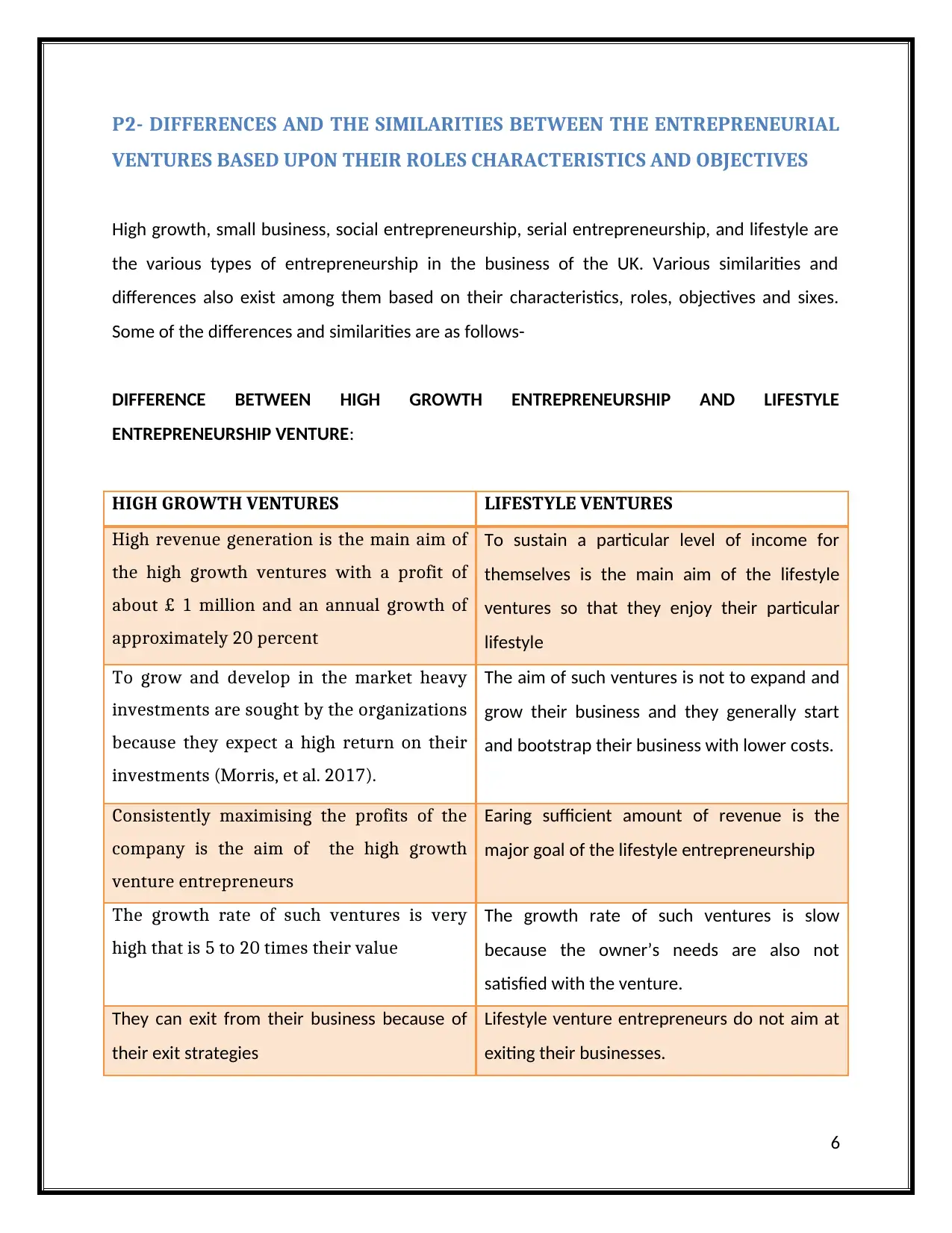
P2- DIFFERENCES AND THE SIMILARITIES BETWEEN THE ENTREPRENEURIAL
VENTURES BASED UPON THEIR ROLES CHARACTERISTICS AND OBJECTIVES
High growth, small business, social entrepreneurship, serial entrepreneurship, and lifestyle are
the various types of entrepreneurship in the business of the UK. Various similarities and
differences also exist among them based on their characteristics, roles, objectives and sixes.
Some of the differences and similarities are as follows-
DIFFERENCE BETWEEN HIGH GROWTH ENTREPRENEURSHIP AND LIFESTYLE
ENTREPRENEURSHIP VENTURE:
HIGH GROWTH VENTURES LIFESTYLE VENTURES
High revenue generation is the main aim of
the high growth ventures with a profit of
about £ 1 million and an annual growth of
approximately 20 percent
To sustain a particular level of income for
themselves is the main aim of the lifestyle
ventures so that they enjoy their particular
lifestyle
To grow and develop in the market heavy
investments are sought by the organizations
because they expect a high return on their
investments (Morris, et al. 2017).
The aim of such ventures is not to expand and
grow their business and they generally start
and bootstrap their business with lower costs.
Consistently maximising the profits of the
company is the aim of the high growth
venture entrepreneurs
Earing sufficient amount of revenue is the
major goal of the lifestyle entrepreneurship
The growth rate of such ventures is very
high that is 5 to 20 times their value
The growth rate of such ventures is slow
because the owner’s needs are also not
satisfied with the venture.
They can exit from their business because of
their exit strategies
Lifestyle venture entrepreneurs do not aim at
exiting their businesses.
6
VENTURES BASED UPON THEIR ROLES CHARACTERISTICS AND OBJECTIVES
High growth, small business, social entrepreneurship, serial entrepreneurship, and lifestyle are
the various types of entrepreneurship in the business of the UK. Various similarities and
differences also exist among them based on their characteristics, roles, objectives and sixes.
Some of the differences and similarities are as follows-
DIFFERENCE BETWEEN HIGH GROWTH ENTREPRENEURSHIP AND LIFESTYLE
ENTREPRENEURSHIP VENTURE:
HIGH GROWTH VENTURES LIFESTYLE VENTURES
High revenue generation is the main aim of
the high growth ventures with a profit of
about £ 1 million and an annual growth of
approximately 20 percent
To sustain a particular level of income for
themselves is the main aim of the lifestyle
ventures so that they enjoy their particular
lifestyle
To grow and develop in the market heavy
investments are sought by the organizations
because they expect a high return on their
investments (Morris, et al. 2017).
The aim of such ventures is not to expand and
grow their business and they generally start
and bootstrap their business with lower costs.
Consistently maximising the profits of the
company is the aim of the high growth
venture entrepreneurs
Earing sufficient amount of revenue is the
major goal of the lifestyle entrepreneurship
The growth rate of such ventures is very
high that is 5 to 20 times their value
The growth rate of such ventures is slow
because the owner’s needs are also not
satisfied with the venture.
They can exit from their business because of
their exit strategies
Lifestyle venture entrepreneurs do not aim at
exiting their businesses.
6
Paraphrase This Document
Need a fresh take? Get an instant paraphrase of this document with our AI Paraphraser
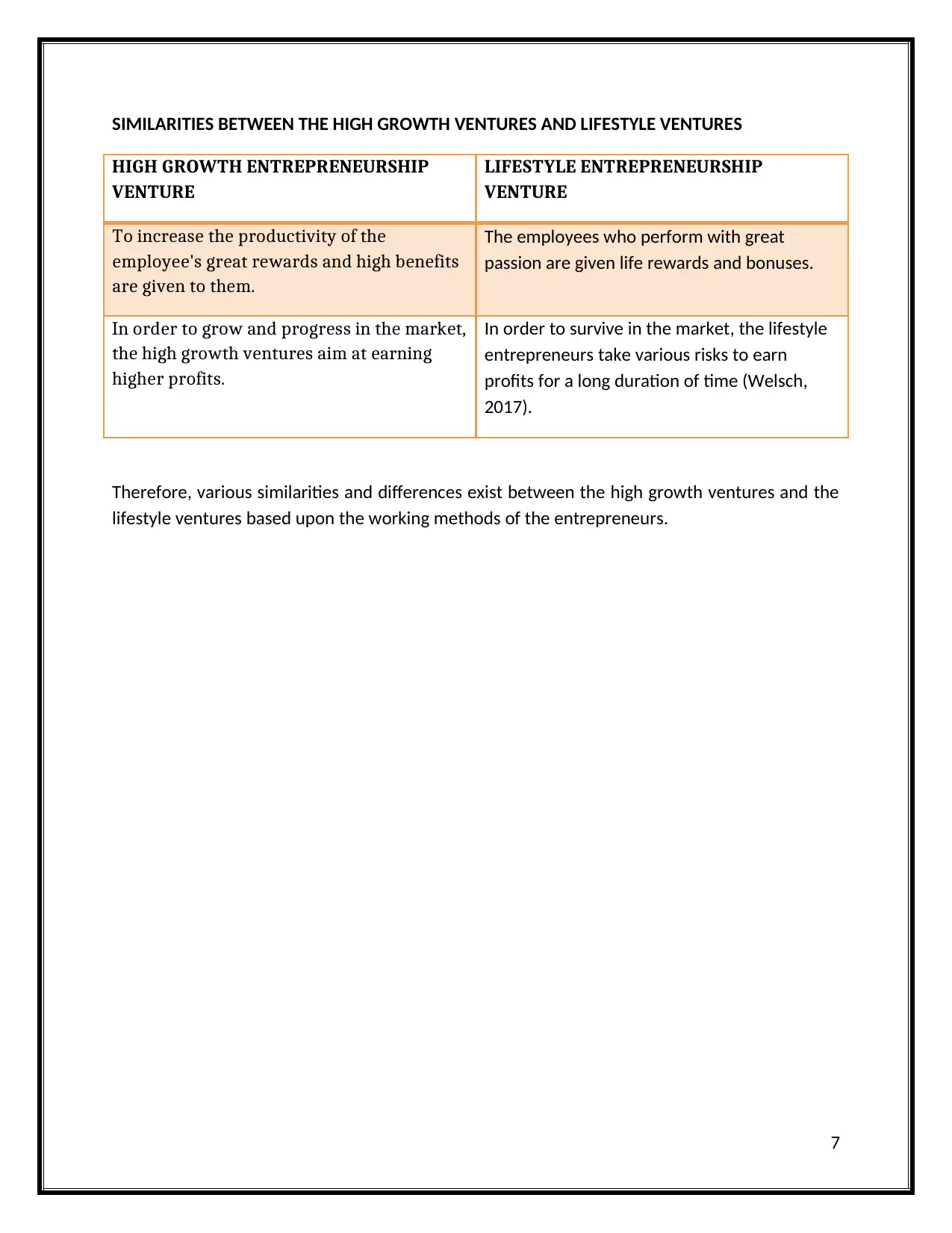
SIMILARITIES BETWEEN THE HIGH GROWTH VENTURES AND LIFESTYLE VENTURES
HIGH GROWTH ENTREPRENEURSHIP
VENTURE
LIFESTYLE ENTREPRENEURSHIP
VENTURE
To increase the productivity of the
employee's great rewards and high benefits
are given to them.
The employees who perform with great
passion are given life rewards and bonuses.
In order to grow and progress in the market,
the high growth ventures aim at earning
higher profits.
In order to survive in the market, the lifestyle
entrepreneurs take various risks to earn
profits for a long duration of time (Welsch,
2017).
Therefore, various similarities and differences exist between the high growth ventures and the
lifestyle ventures based upon the working methods of the entrepreneurs.
7
HIGH GROWTH ENTREPRENEURSHIP
VENTURE
LIFESTYLE ENTREPRENEURSHIP
VENTURE
To increase the productivity of the
employee's great rewards and high benefits
are given to them.
The employees who perform with great
passion are given life rewards and bonuses.
In order to grow and progress in the market,
the high growth ventures aim at earning
higher profits.
In order to survive in the market, the lifestyle
entrepreneurs take various risks to earn
profits for a long duration of time (Welsch,
2017).
Therefore, various similarities and differences exist between the high growth ventures and the
lifestyle ventures based upon the working methods of the entrepreneurs.
7
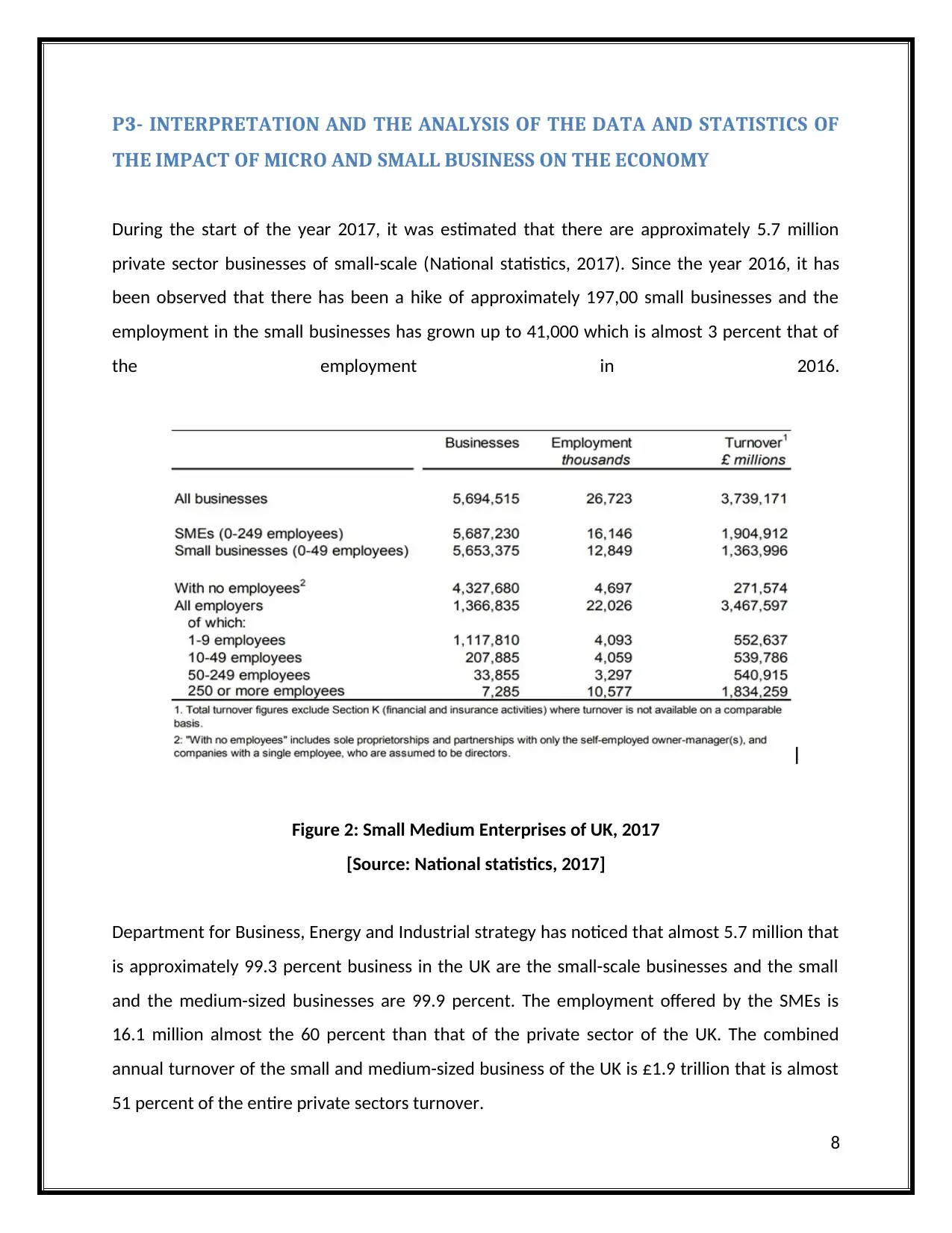
P3- INTERPRETATION AND THE ANALYSIS OF THE DATA AND STATISTICS OF
THE IMPACT OF MICRO AND SMALL BUSINESS ON THE ECONOMY
During the start of the year 2017, it was estimated that there are approximately 5.7 million
private sector businesses of small-scale (National statistics, 2017). Since the year 2016, it has
been observed that there has been a hike of approximately 197,00 small businesses and the
employment in the small businesses has grown up to 41,000 which is almost 3 percent that of
the employment in 2016.
Figure 2: Small Medium Enterprises of UK, 2017
[Source: National statistics, 2017]
Department for Business, Energy and Industrial strategy has noticed that almost 5.7 million that
is approximately 99.3 percent business in the UK are the small-scale businesses and the small
and the medium-sized businesses are 99.9 percent. The employment offered by the SMEs is
16.1 million almost the 60 percent than that of the private sector of the UK. The combined
annual turnover of the small and medium-sized business of the UK is £1.9 trillion that is almost
51 percent of the entire private sectors turnover.
8
THE IMPACT OF MICRO AND SMALL BUSINESS ON THE ECONOMY
During the start of the year 2017, it was estimated that there are approximately 5.7 million
private sector businesses of small-scale (National statistics, 2017). Since the year 2016, it has
been observed that there has been a hike of approximately 197,00 small businesses and the
employment in the small businesses has grown up to 41,000 which is almost 3 percent that of
the employment in 2016.
Figure 2: Small Medium Enterprises of UK, 2017
[Source: National statistics, 2017]
Department for Business, Energy and Industrial strategy has noticed that almost 5.7 million that
is approximately 99.3 percent business in the UK are the small-scale businesses and the small
and the medium-sized businesses are 99.9 percent. The employment offered by the SMEs is
16.1 million almost the 60 percent than that of the private sector of the UK. The combined
annual turnover of the small and medium-sized business of the UK is £1.9 trillion that is almost
51 percent of the entire private sectors turnover.
8

The small and the medium-sized enterprises of the UK maintain the economy of the country by
playing a significant role in it. The productivity of the United Kingdom has boosted by
approximately 47 percent by increasing the revenues of the UK, which adds to the economy of
the country that has been observed by the Economic and the Social Research Council (Flynn, et
al. 2015). There is a great need that these businesses must be supported by the investment of
some capital on them so that their businesses can be expanded and economy can be increased.
9
playing a significant role in it. The productivity of the United Kingdom has boosted by
approximately 47 percent by increasing the revenues of the UK, which adds to the economy of
the country that has been observed by the Economic and the Social Research Council (Flynn, et
al. 2015). There is a great need that these businesses must be supported by the investment of
some capital on them so that their businesses can be expanded and economy can be increased.
9
Secure Best Marks with AI Grader
Need help grading? Try our AI Grader for instant feedback on your assignments.
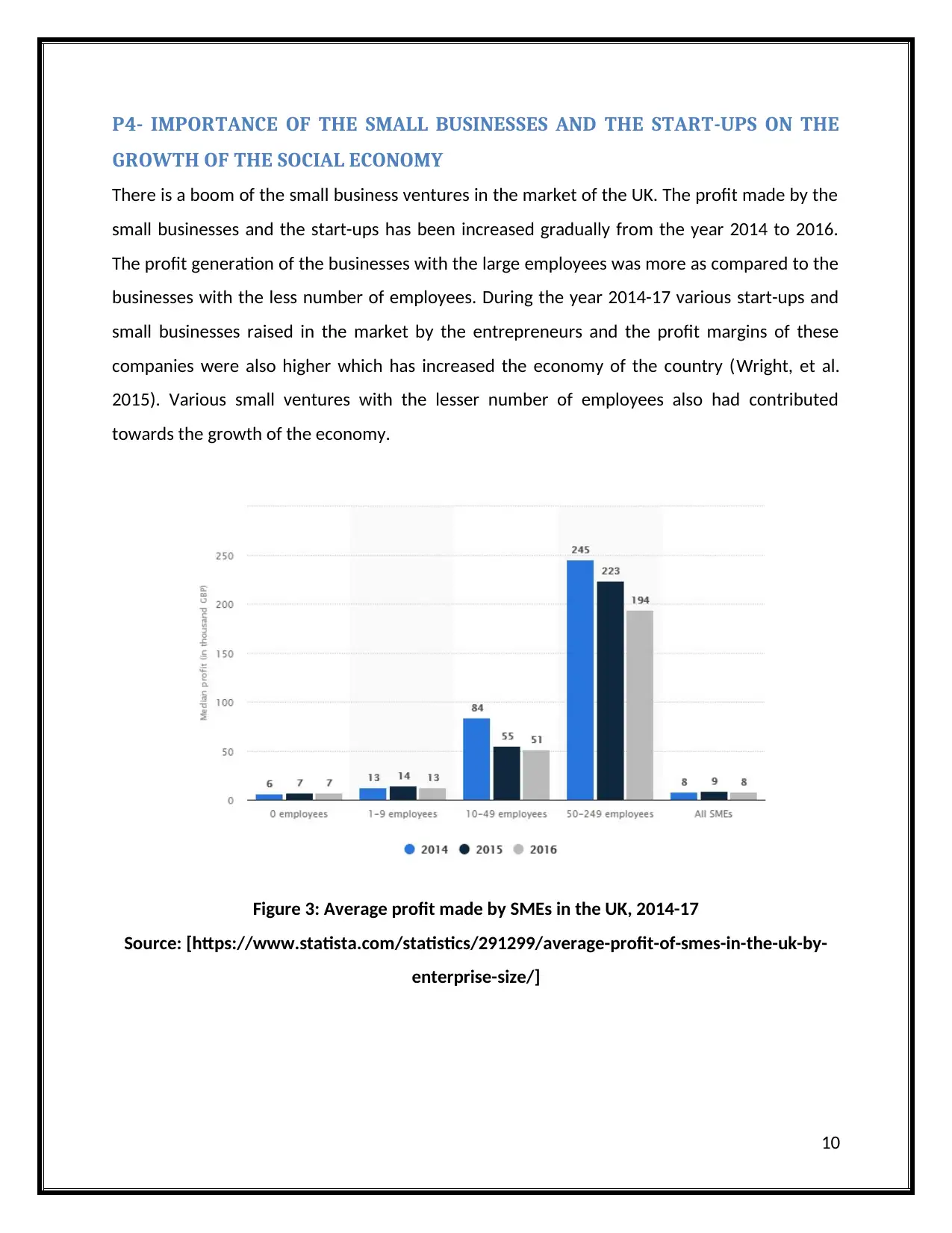
P4- IMPORTANCE OF THE SMALL BUSINESSES AND THE START-UPS ON THE
GROWTH OF THE SOCIAL ECONOMY
There is a boom of the small business ventures in the market of the UK. The profit made by the
small businesses and the start-ups has been increased gradually from the year 2014 to 2016.
The profit generation of the businesses with the large employees was more as compared to the
businesses with the less number of employees. During the year 2014-17 various start-ups and
small businesses raised in the market by the entrepreneurs and the profit margins of these
companies were also higher which has increased the economy of the country (Wright, et al.
2015). Various small ventures with the lesser number of employees also had contributed
towards the growth of the economy.
Figure 3: Average profit made by SMEs in the UK, 2014-17
Source: [https://www.statista.com/statistics/291299/average-profit-of-smes-in-the-uk-by-
enterprise-size/]
10
GROWTH OF THE SOCIAL ECONOMY
There is a boom of the small business ventures in the market of the UK. The profit made by the
small businesses and the start-ups has been increased gradually from the year 2014 to 2016.
The profit generation of the businesses with the large employees was more as compared to the
businesses with the less number of employees. During the year 2014-17 various start-ups and
small businesses raised in the market by the entrepreneurs and the profit margins of these
companies were also higher which has increased the economy of the country (Wright, et al.
2015). Various small ventures with the lesser number of employees also had contributed
towards the growth of the economy.
Figure 3: Average profit made by SMEs in the UK, 2014-17
Source: [https://www.statista.com/statistics/291299/average-profit-of-smes-in-the-uk-by-
enterprise-size/]
10
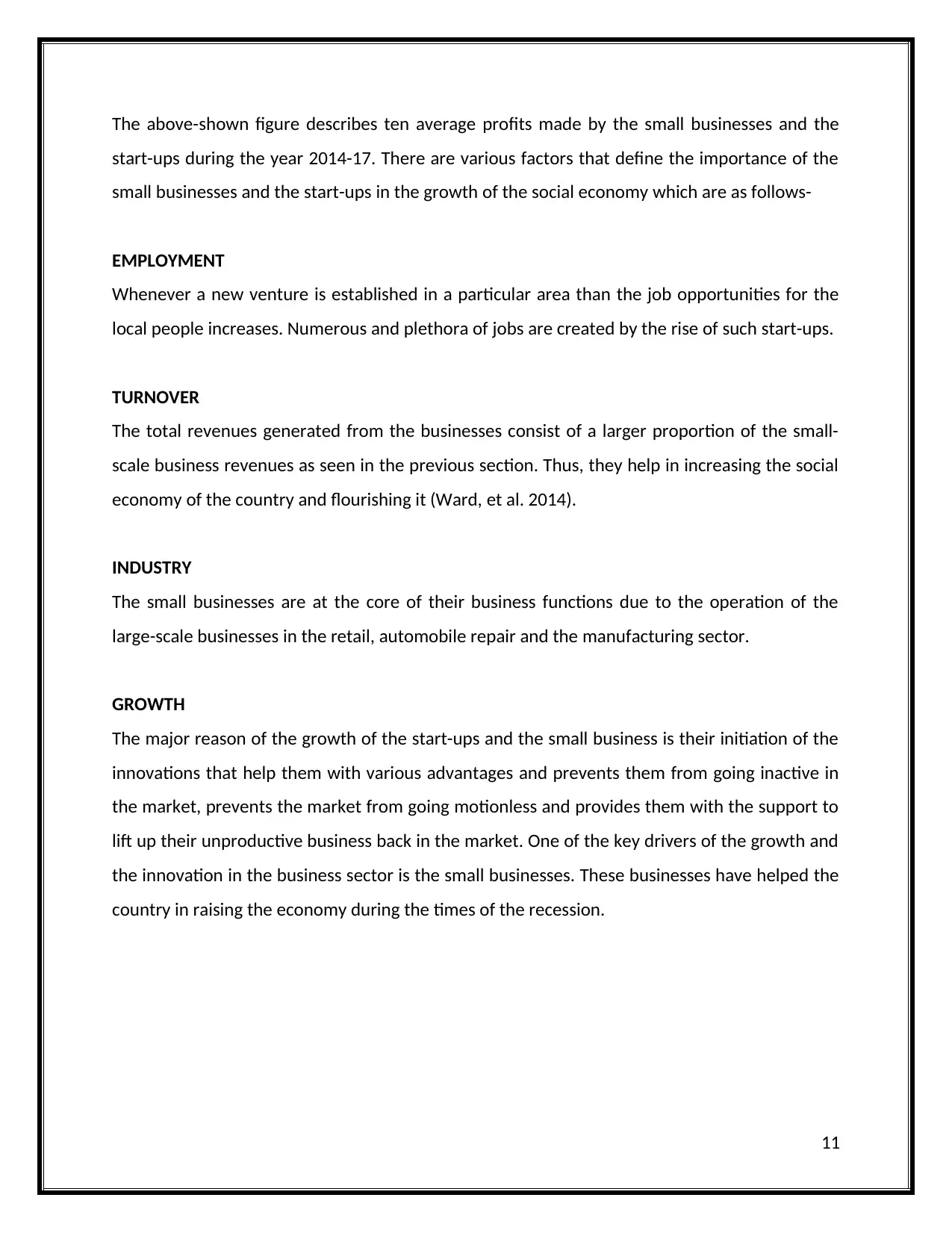
The above-shown figure describes ten average profits made by the small businesses and the
start-ups during the year 2014-17. There are various factors that define the importance of the
small businesses and the start-ups in the growth of the social economy which are as follows-
EMPLOYMENT
Whenever a new venture is established in a particular area than the job opportunities for the
local people increases. Numerous and plethora of jobs are created by the rise of such start-ups.
TURNOVER
The total revenues generated from the businesses consist of a larger proportion of the small-
scale business revenues as seen in the previous section. Thus, they help in increasing the social
economy of the country and flourishing it (Ward, et al. 2014).
INDUSTRY
The small businesses are at the core of their business functions due to the operation of the
large-scale businesses in the retail, automobile repair and the manufacturing sector.
GROWTH
The major reason of the growth of the start-ups and the small business is their initiation of the
innovations that help them with various advantages and prevents them from going inactive in
the market, prevents the market from going motionless and provides them with the support to
lift up their unproductive business back in the market. One of the key drivers of the growth and
the innovation in the business sector is the small businesses. These businesses have helped the
country in raising the economy during the times of the recession.
11
start-ups during the year 2014-17. There are various factors that define the importance of the
small businesses and the start-ups in the growth of the social economy which are as follows-
EMPLOYMENT
Whenever a new venture is established in a particular area than the job opportunities for the
local people increases. Numerous and plethora of jobs are created by the rise of such start-ups.
TURNOVER
The total revenues generated from the businesses consist of a larger proportion of the small-
scale business revenues as seen in the previous section. Thus, they help in increasing the social
economy of the country and flourishing it (Ward, et al. 2014).
INDUSTRY
The small businesses are at the core of their business functions due to the operation of the
large-scale businesses in the retail, automobile repair and the manufacturing sector.
GROWTH
The major reason of the growth of the start-ups and the small business is their initiation of the
innovations that help them with various advantages and prevents them from going inactive in
the market, prevents the market from going motionless and provides them with the support to
lift up their unproductive business back in the market. One of the key drivers of the growth and
the innovation in the business sector is the small businesses. These businesses have helped the
country in raising the economy during the times of the recession.
11
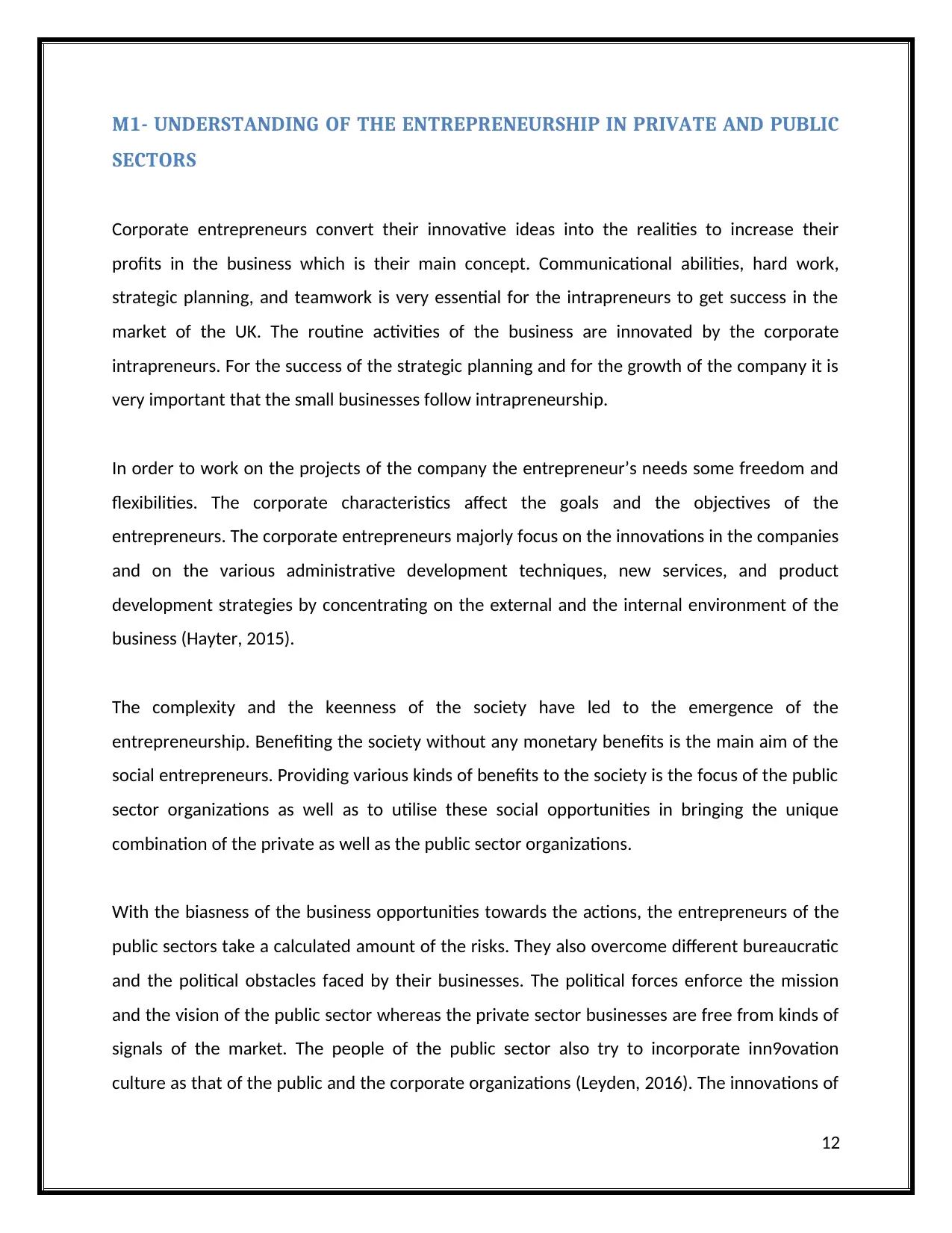
M1- UNDERSTANDING OF THE ENTREPRENEURSHIP IN PRIVATE AND PUBLIC
SECTORS
Corporate entrepreneurs convert their innovative ideas into the realities to increase their
profits in the business which is their main concept. Communicational abilities, hard work,
strategic planning, and teamwork is very essential for the intrapreneurs to get success in the
market of the UK. The routine activities of the business are innovated by the corporate
intrapreneurs. For the success of the strategic planning and for the growth of the company it is
very important that the small businesses follow intrapreneurship.
In order to work on the projects of the company the entrepreneur’s needs some freedom and
flexibilities. The corporate characteristics affect the goals and the objectives of the
entrepreneurs. The corporate entrepreneurs majorly focus on the innovations in the companies
and on the various administrative development techniques, new services, and product
development strategies by concentrating on the external and the internal environment of the
business (Hayter, 2015).
The complexity and the keenness of the society have led to the emergence of the
entrepreneurship. Benefiting the society without any monetary benefits is the main aim of the
social entrepreneurs. Providing various kinds of benefits to the society is the focus of the public
sector organizations as well as to utilise these social opportunities in bringing the unique
combination of the private as well as the public sector organizations.
With the biasness of the business opportunities towards the actions, the entrepreneurs of the
public sectors take a calculated amount of the risks. They also overcome different bureaucratic
and the political obstacles faced by their businesses. The political forces enforce the mission
and the vision of the public sector whereas the private sector businesses are free from kinds of
signals of the market. The people of the public sector also try to incorporate inn9ovation
culture as that of the public and the corporate organizations (Leyden, 2016). The innovations of
12
SECTORS
Corporate entrepreneurs convert their innovative ideas into the realities to increase their
profits in the business which is their main concept. Communicational abilities, hard work,
strategic planning, and teamwork is very essential for the intrapreneurs to get success in the
market of the UK. The routine activities of the business are innovated by the corporate
intrapreneurs. For the success of the strategic planning and for the growth of the company it is
very important that the small businesses follow intrapreneurship.
In order to work on the projects of the company the entrepreneur’s needs some freedom and
flexibilities. The corporate characteristics affect the goals and the objectives of the
entrepreneurs. The corporate entrepreneurs majorly focus on the innovations in the companies
and on the various administrative development techniques, new services, and product
development strategies by concentrating on the external and the internal environment of the
business (Hayter, 2015).
The complexity and the keenness of the society have led to the emergence of the
entrepreneurship. Benefiting the society without any monetary benefits is the main aim of the
social entrepreneurs. Providing various kinds of benefits to the society is the focus of the public
sector organizations as well as to utilise these social opportunities in bringing the unique
combination of the private as well as the public sector organizations.
With the biasness of the business opportunities towards the actions, the entrepreneurs of the
public sectors take a calculated amount of the risks. They also overcome different bureaucratic
and the political obstacles faced by their businesses. The political forces enforce the mission
and the vision of the public sector whereas the private sector businesses are free from kinds of
signals of the market. The people of the public sector also try to incorporate inn9ovation
culture as that of the public and the corporate organizations (Leyden, 2016). The innovations of
12
Paraphrase This Document
Need a fresh take? Get an instant paraphrase of this document with our AI Paraphraser

the public sectors are not at all benefitted by the traditional rule-bounds and inflexibilities of
the government personnel system.
13
the government personnel system.
13
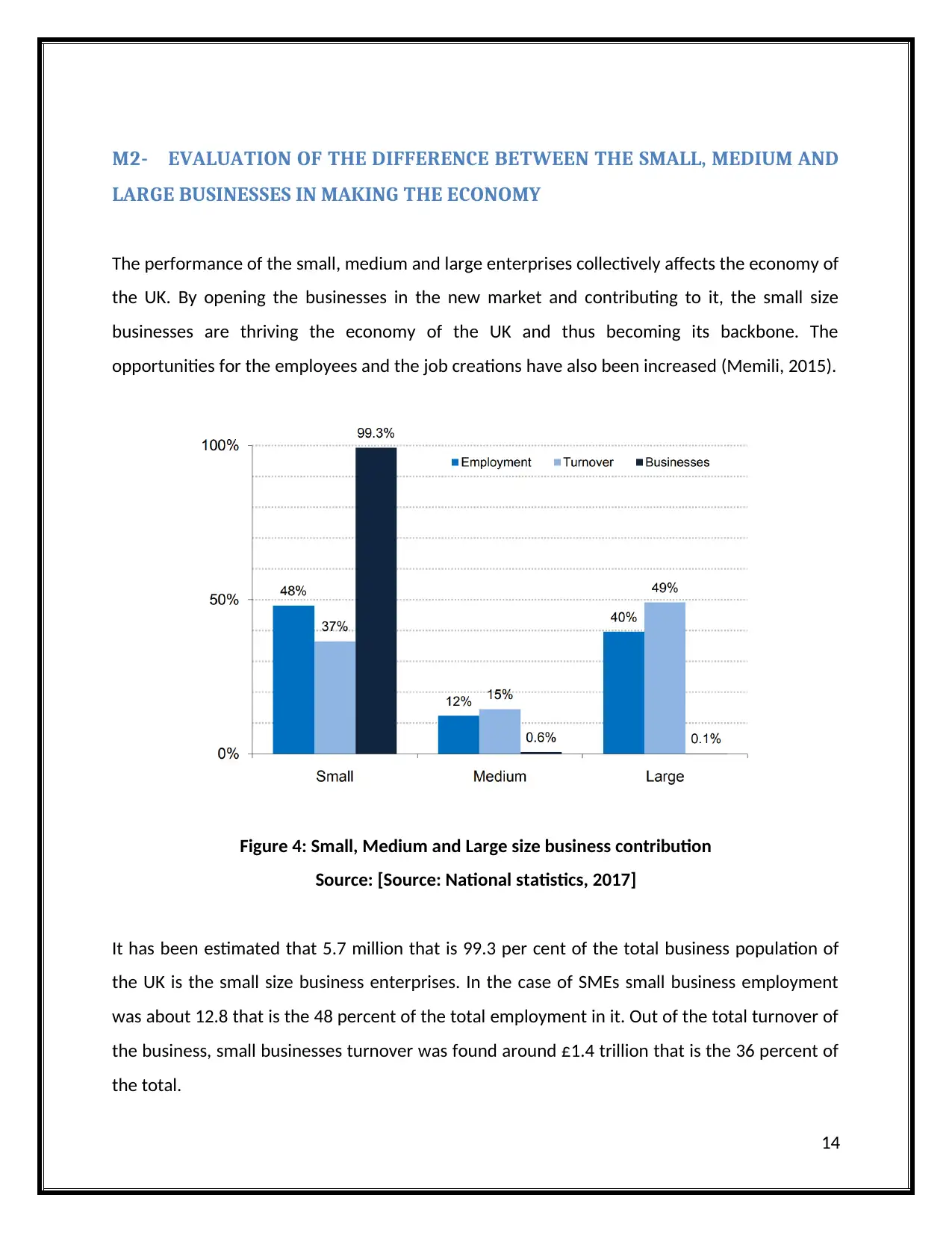
M2- EVALUATION OF THE DIFFERENCE BETWEEN THE SMALL, MEDIUM AND
LARGE BUSINESSES IN MAKING THE ECONOMY
The performance of the small, medium and large enterprises collectively affects the economy of
the UK. By opening the businesses in the new market and contributing to it, the small size
businesses are thriving the economy of the UK and thus becoming its backbone. The
opportunities for the employees and the job creations have also been increased (Memili, 2015).
Figure 4: Small, Medium and Large size business contribution
Source: [Source: National statistics, 2017]
It has been estimated that 5.7 million that is 99.3 per cent of the total business population of
the UK is the small size business enterprises. In the case of SMEs small business employment
was about 12.8 that is the 48 percent of the total employment in it. Out of the total turnover of
the business, small businesses turnover was found around £1.4 trillion that is the 36 percent of
the total.
14
LARGE BUSINESSES IN MAKING THE ECONOMY
The performance of the small, medium and large enterprises collectively affects the economy of
the UK. By opening the businesses in the new market and contributing to it, the small size
businesses are thriving the economy of the UK and thus becoming its backbone. The
opportunities for the employees and the job creations have also been increased (Memili, 2015).
Figure 4: Small, Medium and Large size business contribution
Source: [Source: National statistics, 2017]
It has been estimated that 5.7 million that is 99.3 per cent of the total business population of
the UK is the small size business enterprises. In the case of SMEs small business employment
was about 12.8 that is the 48 percent of the total employment in it. Out of the total turnover of
the business, small businesses turnover was found around £1.4 trillion that is the 36 percent of
the total.
14

Medium size business enterprises of the UK are very less that is only 0.6 per cent of the total
business population of the country. Out of the total employment in the SMEs, the employment
rate in the medium size businesses was 12 per cent that is only 3.6 million people. Out of the
total turnover of the business, the turnover of the medium-sized businesses is £5.4 million that
is 15per cent of the total.
Whereas the large sized business in the UK is comparatively much lesser than the small and the
medium-sized enterprise. They are only 7,300 in number that is approximately only 0.1 per cent
of the total business population. But, the employment generation of the large-scale businesses
is very high that 10.6 million which is 40 per cent of the employment in the small and the
medium-sized business (Storey, 2016). The overall turnover of the large businesses is also very
high that is £1.8 million becoming 49 per cent of the total.
15
business population of the country. Out of the total employment in the SMEs, the employment
rate in the medium size businesses was 12 per cent that is only 3.6 million people. Out of the
total turnover of the business, the turnover of the medium-sized businesses is £5.4 million that
is 15per cent of the total.
Whereas the large sized business in the UK is comparatively much lesser than the small and the
medium-sized enterprise. They are only 7,300 in number that is approximately only 0.1 per cent
of the total business population. But, the employment generation of the large-scale businesses
is very high that 10.6 million which is 40 per cent of the employment in the small and the
medium-sized business (Storey, 2016). The overall turnover of the large businesses is also very
high that is £1.8 million becoming 49 per cent of the total.
15
Secure Best Marks with AI Grader
Need help grading? Try our AI Grader for instant feedback on your assignments.
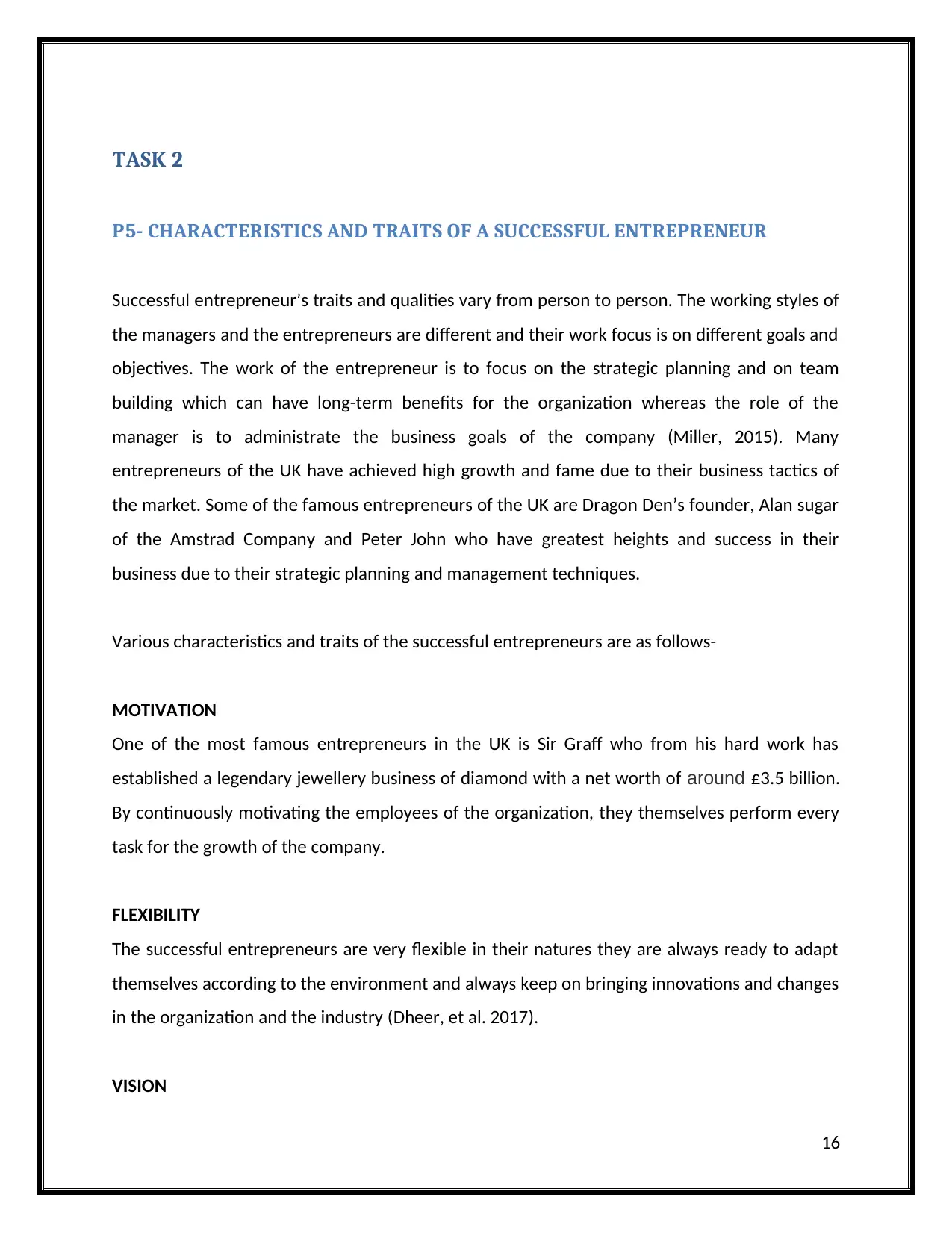
TASK 2
P5- CHARACTERISTICS AND TRAITS OF A SUCCESSFUL ENTREPRENEUR
Successful entrepreneur’s traits and qualities vary from person to person. The working styles of
the managers and the entrepreneurs are different and their work focus is on different goals and
objectives. The work of the entrepreneur is to focus on the strategic planning and on team
building which can have long-term benefits for the organization whereas the role of the
manager is to administrate the business goals of the company (Miller, 2015). Many
entrepreneurs of the UK have achieved high growth and fame due to their business tactics of
the market. Some of the famous entrepreneurs of the UK are Dragon Den’s founder, Alan sugar
of the Amstrad Company and Peter John who have greatest heights and success in their
business due to their strategic planning and management techniques.
Various characteristics and traits of the successful entrepreneurs are as follows-
MOTIVATION
One of the most famous entrepreneurs in the UK is Sir Graff who from his hard work has
established a legendary jewellery business of diamond with a net worth of around £3.5 billion.
By continuously motivating the employees of the organization, they themselves perform every
task for the growth of the company.
FLEXIBILITY
The successful entrepreneurs are very flexible in their natures they are always ready to adapt
themselves according to the environment and always keep on bringing innovations and changes
in the organization and the industry (Dheer, et al. 2017).
VISION
16
P5- CHARACTERISTICS AND TRAITS OF A SUCCESSFUL ENTREPRENEUR
Successful entrepreneur’s traits and qualities vary from person to person. The working styles of
the managers and the entrepreneurs are different and their work focus is on different goals and
objectives. The work of the entrepreneur is to focus on the strategic planning and on team
building which can have long-term benefits for the organization whereas the role of the
manager is to administrate the business goals of the company (Miller, 2015). Many
entrepreneurs of the UK have achieved high growth and fame due to their business tactics of
the market. Some of the famous entrepreneurs of the UK are Dragon Den’s founder, Alan sugar
of the Amstrad Company and Peter John who have greatest heights and success in their
business due to their strategic planning and management techniques.
Various characteristics and traits of the successful entrepreneurs are as follows-
MOTIVATION
One of the most famous entrepreneurs in the UK is Sir Graff who from his hard work has
established a legendary jewellery business of diamond with a net worth of around £3.5 billion.
By continuously motivating the employees of the organization, they themselves perform every
task for the growth of the company.
FLEXIBILITY
The successful entrepreneurs are very flexible in their natures they are always ready to adapt
themselves according to the environment and always keep on bringing innovations and changes
in the organization and the industry (Dheer, et al. 2017).
VISION
16
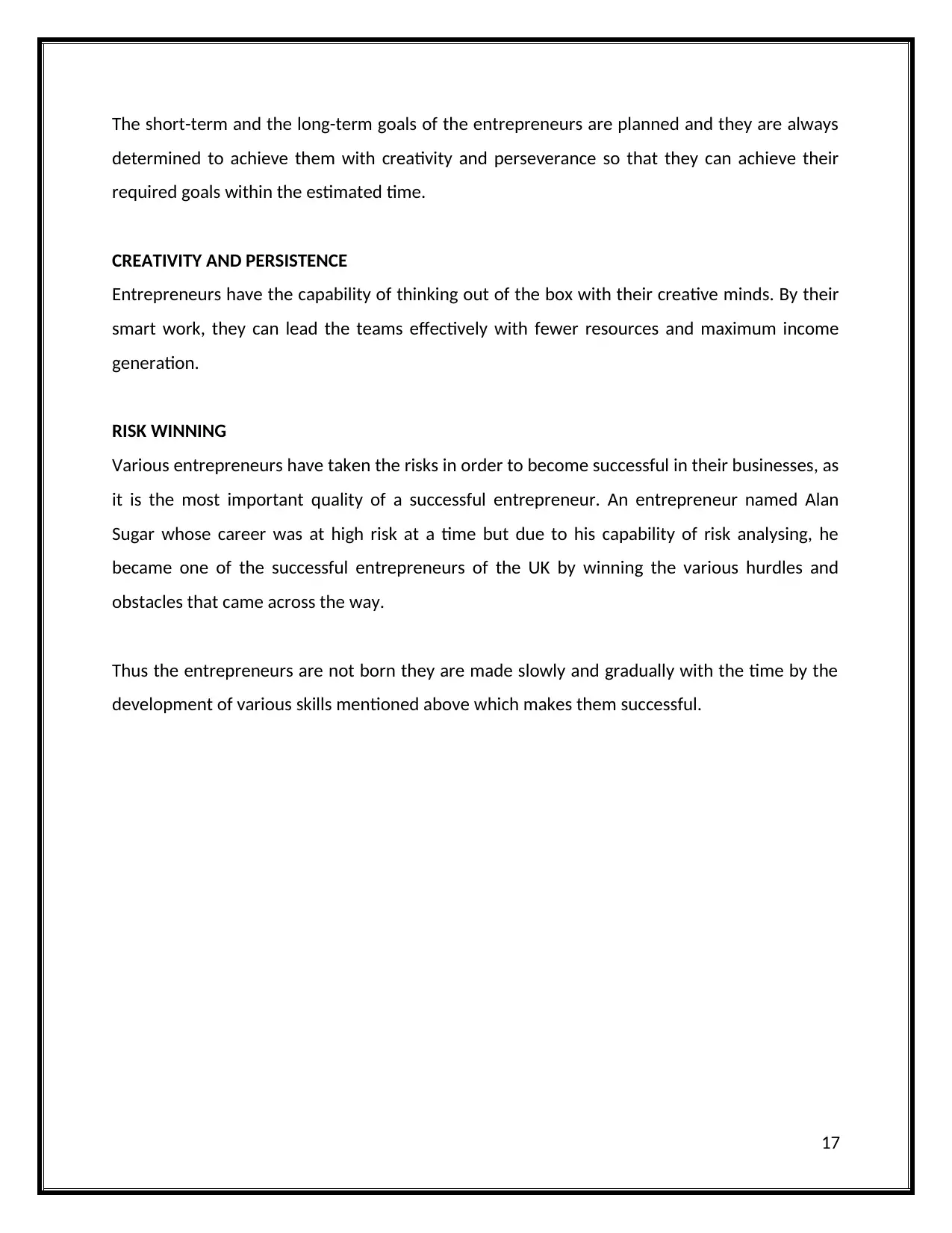
The short-term and the long-term goals of the entrepreneurs are planned and they are always
determined to achieve them with creativity and perseverance so that they can achieve their
required goals within the estimated time.
CREATIVITY AND PERSISTENCE
Entrepreneurs have the capability of thinking out of the box with their creative minds. By their
smart work, they can lead the teams effectively with fewer resources and maximum income
generation.
RISK WINNING
Various entrepreneurs have taken the risks in order to become successful in their businesses, as
it is the most important quality of a successful entrepreneur. An entrepreneur named Alan
Sugar whose career was at high risk at a time but due to his capability of risk analysing, he
became one of the successful entrepreneurs of the UK by winning the various hurdles and
obstacles that came across the way.
Thus the entrepreneurs are not born they are made slowly and gradually with the time by the
development of various skills mentioned above which makes them successful.
17
determined to achieve them with creativity and perseverance so that they can achieve their
required goals within the estimated time.
CREATIVITY AND PERSISTENCE
Entrepreneurs have the capability of thinking out of the box with their creative minds. By their
smart work, they can lead the teams effectively with fewer resources and maximum income
generation.
RISK WINNING
Various entrepreneurs have taken the risks in order to become successful in their businesses, as
it is the most important quality of a successful entrepreneur. An entrepreneur named Alan
Sugar whose career was at high risk at a time but due to his capability of risk analysing, he
became one of the successful entrepreneurs of the UK by winning the various hurdles and
obstacles that came across the way.
Thus the entrepreneurs are not born they are made slowly and gradually with the time by the
development of various skills mentioned above which makes them successful.
17
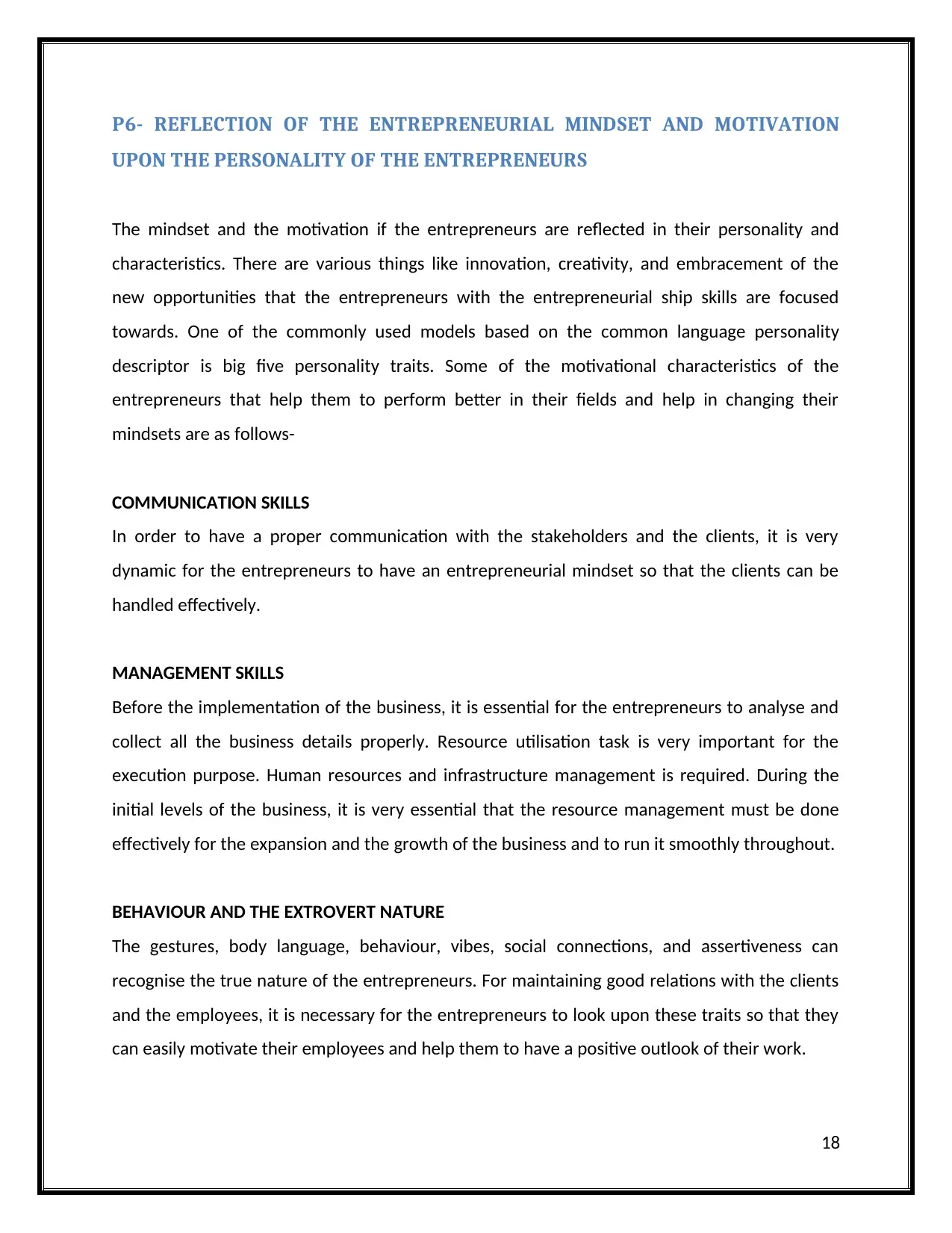
P6- REFLECTION OF THE ENTREPRENEURIAL MINDSET AND MOTIVATION
UPON THE PERSONALITY OF THE ENTREPRENEURS
The mindset and the motivation if the entrepreneurs are reflected in their personality and
characteristics. There are various things like innovation, creativity, and embracement of the
new opportunities that the entrepreneurs with the entrepreneurial ship skills are focused
towards. One of the commonly used models based on the common language personality
descriptor is big five personality traits. Some of the motivational characteristics of the
entrepreneurs that help them to perform better in their fields and help in changing their
mindsets are as follows-
COMMUNICATION SKILLS
In order to have a proper communication with the stakeholders and the clients, it is very
dynamic for the entrepreneurs to have an entrepreneurial mindset so that the clients can be
handled effectively.
MANAGEMENT SKILLS
Before the implementation of the business, it is essential for the entrepreneurs to analyse and
collect all the business details properly. Resource utilisation task is very important for the
execution purpose. Human resources and infrastructure management is required. During the
initial levels of the business, it is very essential that the resource management must be done
effectively for the expansion and the growth of the business and to run it smoothly throughout.
BEHAVIOUR AND THE EXTROVERT NATURE
The gestures, body language, behaviour, vibes, social connections, and assertiveness can
recognise the true nature of the entrepreneurs. For maintaining good relations with the clients
and the employees, it is necessary for the entrepreneurs to look upon these traits so that they
can easily motivate their employees and help them to have a positive outlook of their work.
18
UPON THE PERSONALITY OF THE ENTREPRENEURS
The mindset and the motivation if the entrepreneurs are reflected in their personality and
characteristics. There are various things like innovation, creativity, and embracement of the
new opportunities that the entrepreneurs with the entrepreneurial ship skills are focused
towards. One of the commonly used models based on the common language personality
descriptor is big five personality traits. Some of the motivational characteristics of the
entrepreneurs that help them to perform better in their fields and help in changing their
mindsets are as follows-
COMMUNICATION SKILLS
In order to have a proper communication with the stakeholders and the clients, it is very
dynamic for the entrepreneurs to have an entrepreneurial mindset so that the clients can be
handled effectively.
MANAGEMENT SKILLS
Before the implementation of the business, it is essential for the entrepreneurs to analyse and
collect all the business details properly. Resource utilisation task is very important for the
execution purpose. Human resources and infrastructure management is required. During the
initial levels of the business, it is very essential that the resource management must be done
effectively for the expansion and the growth of the business and to run it smoothly throughout.
BEHAVIOUR AND THE EXTROVERT NATURE
The gestures, body language, behaviour, vibes, social connections, and assertiveness can
recognise the true nature of the entrepreneurs. For maintaining good relations with the clients
and the employees, it is necessary for the entrepreneurs to look upon these traits so that they
can easily motivate their employees and help them to have a positive outlook of their work.
18
Paraphrase This Document
Need a fresh take? Get an instant paraphrase of this document with our AI Paraphraser
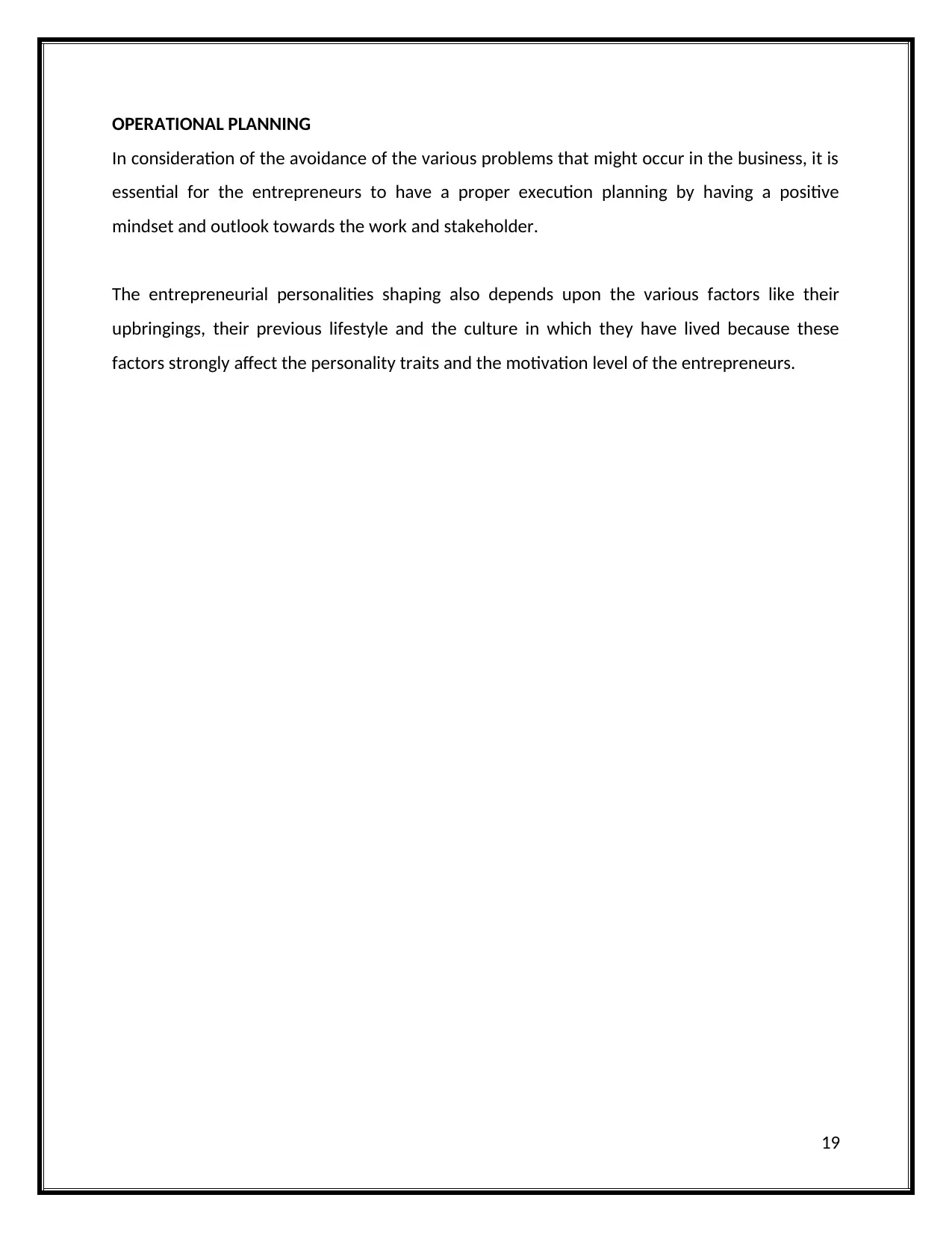
OPERATIONAL PLANNING
In consideration of the avoidance of the various problems that might occur in the business, it is
essential for the entrepreneurs to have a proper execution planning by having a positive
mindset and outlook towards the work and stakeholder.
The entrepreneurial personalities shaping also depends upon the various factors like their
upbringings, their previous lifestyle and the culture in which they have lived because these
factors strongly affect the personality traits and the motivation level of the entrepreneurs.
19
In consideration of the avoidance of the various problems that might occur in the business, it is
essential for the entrepreneurs to have a proper execution planning by having a positive
mindset and outlook towards the work and stakeholder.
The entrepreneurial personalities shaping also depends upon the various factors like their
upbringings, their previous lifestyle and the culture in which they have lived because these
factors strongly affect the personality traits and the motivation level of the entrepreneurs.
19
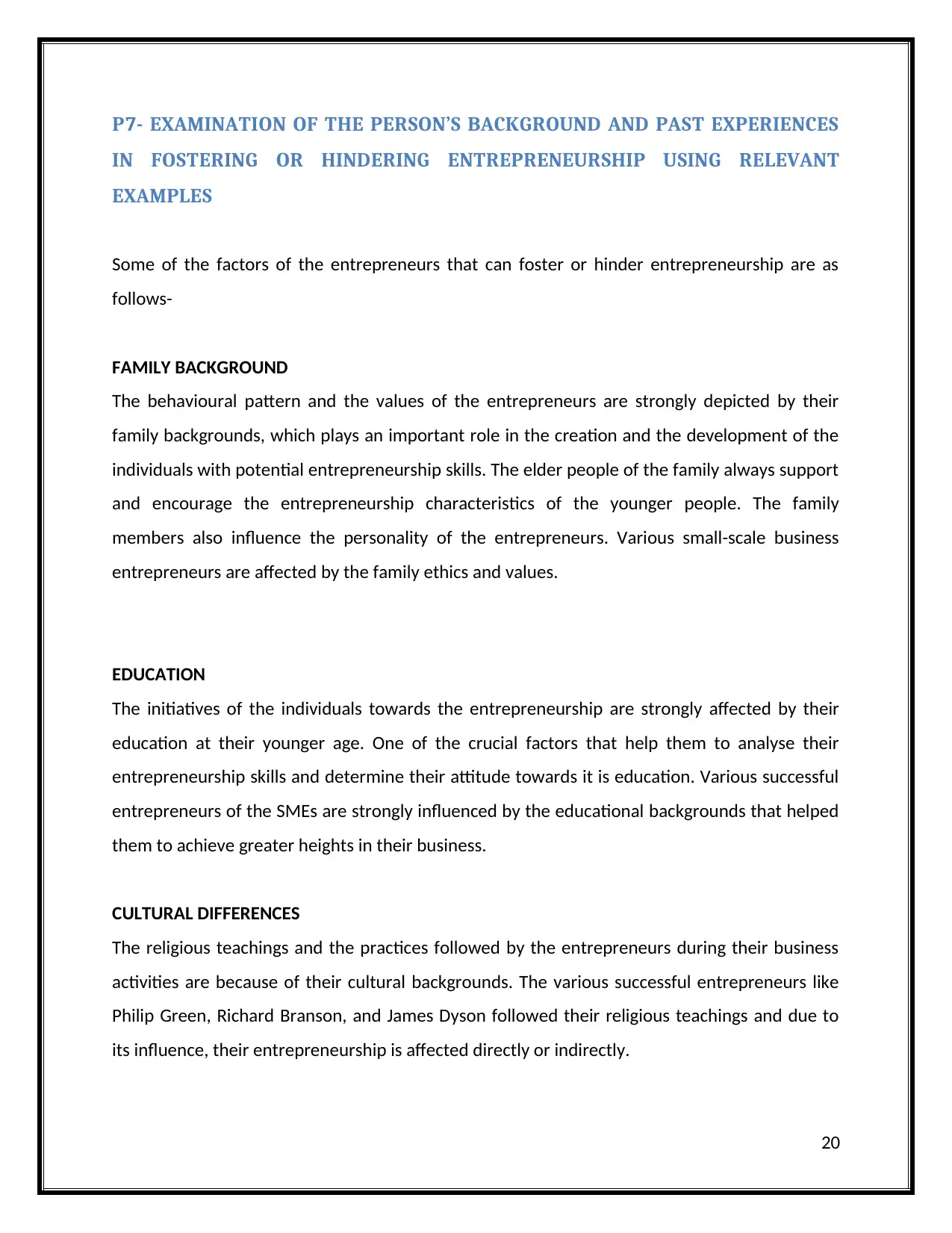
P7- EXAMINATION OF THE PERSON’S BACKGROUND AND PAST EXPERIENCES
IN FOSTERING OR HINDERING ENTREPRENEURSHIP USING RELEVANT
EXAMPLES
Some of the factors of the entrepreneurs that can foster or hinder entrepreneurship are as
follows-
FAMILY BACKGROUND
The behavioural pattern and the values of the entrepreneurs are strongly depicted by their
family backgrounds, which plays an important role in the creation and the development of the
individuals with potential entrepreneurship skills. The elder people of the family always support
and encourage the entrepreneurship characteristics of the younger people. The family
members also influence the personality of the entrepreneurs. Various small-scale business
entrepreneurs are affected by the family ethics and values.
EDUCATION
The initiatives of the individuals towards the entrepreneurship are strongly affected by their
education at their younger age. One of the crucial factors that help them to analyse their
entrepreneurship skills and determine their attitude towards it is education. Various successful
entrepreneurs of the SMEs are strongly influenced by the educational backgrounds that helped
them to achieve greater heights in their business.
CULTURAL DIFFERENCES
The religious teachings and the practices followed by the entrepreneurs during their business
activities are because of their cultural backgrounds. The various successful entrepreneurs like
Philip Green, Richard Branson, and James Dyson followed their religious teachings and due to
its influence, their entrepreneurship is affected directly or indirectly.
20
IN FOSTERING OR HINDERING ENTREPRENEURSHIP USING RELEVANT
EXAMPLES
Some of the factors of the entrepreneurs that can foster or hinder entrepreneurship are as
follows-
FAMILY BACKGROUND
The behavioural pattern and the values of the entrepreneurs are strongly depicted by their
family backgrounds, which plays an important role in the creation and the development of the
individuals with potential entrepreneurship skills. The elder people of the family always support
and encourage the entrepreneurship characteristics of the younger people. The family
members also influence the personality of the entrepreneurs. Various small-scale business
entrepreneurs are affected by the family ethics and values.
EDUCATION
The initiatives of the individuals towards the entrepreneurship are strongly affected by their
education at their younger age. One of the crucial factors that help them to analyse their
entrepreneurship skills and determine their attitude towards it is education. Various successful
entrepreneurs of the SMEs are strongly influenced by the educational backgrounds that helped
them to achieve greater heights in their business.
CULTURAL DIFFERENCES
The religious teachings and the practices followed by the entrepreneurs during their business
activities are because of their cultural backgrounds. The various successful entrepreneurs like
Philip Green, Richard Branson, and James Dyson followed their religious teachings and due to
its influence, their entrepreneurship is affected directly or indirectly.
20
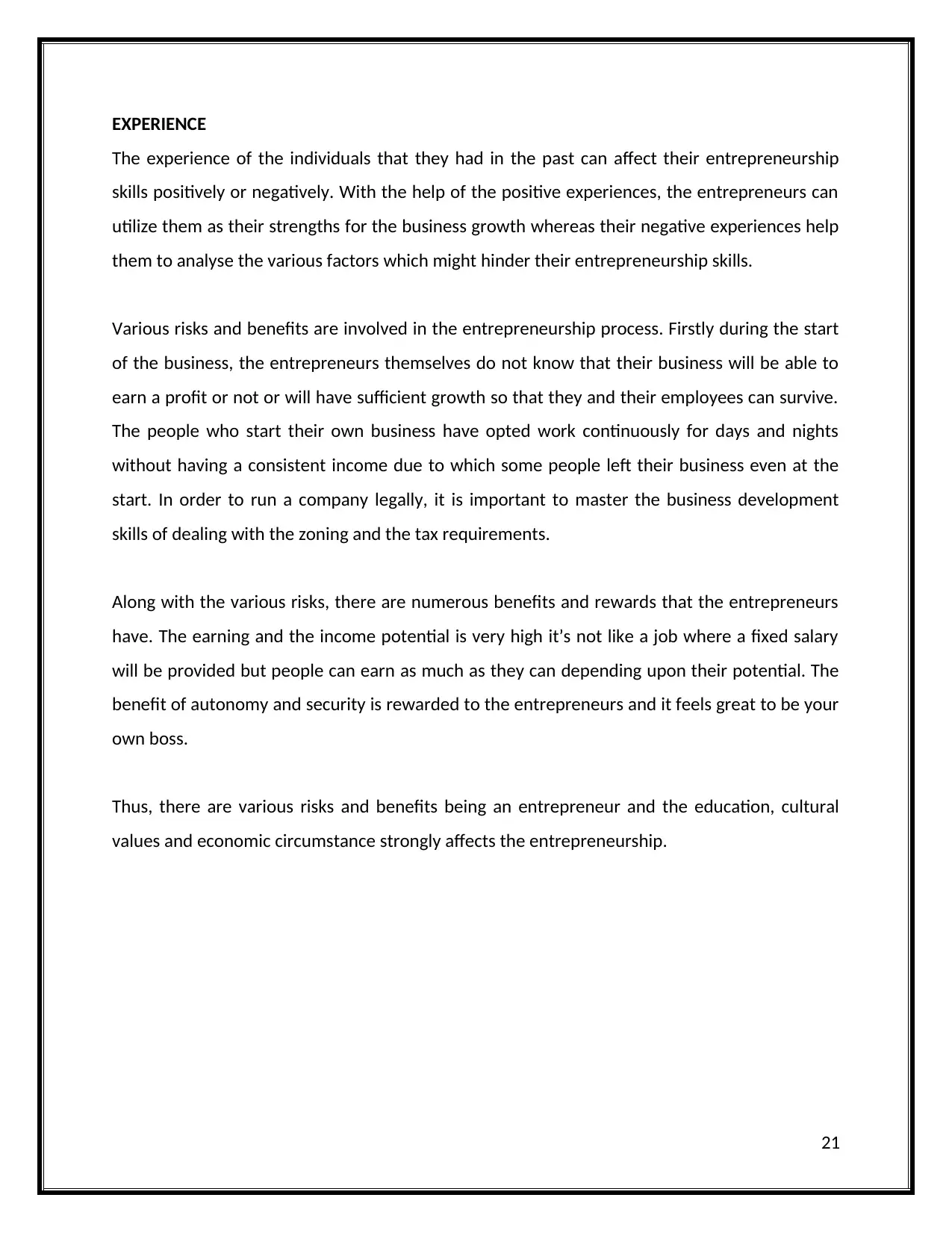
EXPERIENCE
The experience of the individuals that they had in the past can affect their entrepreneurship
skills positively or negatively. With the help of the positive experiences, the entrepreneurs can
utilize them as their strengths for the business growth whereas their negative experiences help
them to analyse the various factors which might hinder their entrepreneurship skills.
Various risks and benefits are involved in the entrepreneurship process. Firstly during the start
of the business, the entrepreneurs themselves do not know that their business will be able to
earn a profit or not or will have sufficient growth so that they and their employees can survive.
The people who start their own business have opted work continuously for days and nights
without having a consistent income due to which some people left their business even at the
start. In order to run a company legally, it is important to master the business development
skills of dealing with the zoning and the tax requirements.
Along with the various risks, there are numerous benefits and rewards that the entrepreneurs
have. The earning and the income potential is very high it’s not like a job where a fixed salary
will be provided but people can earn as much as they can depending upon their potential. The
benefit of autonomy and security is rewarded to the entrepreneurs and it feels great to be your
own boss.
Thus, there are various risks and benefits being an entrepreneur and the education, cultural
values and economic circumstance strongly affects the entrepreneurship.
21
The experience of the individuals that they had in the past can affect their entrepreneurship
skills positively or negatively. With the help of the positive experiences, the entrepreneurs can
utilize them as their strengths for the business growth whereas their negative experiences help
them to analyse the various factors which might hinder their entrepreneurship skills.
Various risks and benefits are involved in the entrepreneurship process. Firstly during the start
of the business, the entrepreneurs themselves do not know that their business will be able to
earn a profit or not or will have sufficient growth so that they and their employees can survive.
The people who start their own business have opted work continuously for days and nights
without having a consistent income due to which some people left their business even at the
start. In order to run a company legally, it is important to master the business development
skills of dealing with the zoning and the tax requirements.
Along with the various risks, there are numerous benefits and rewards that the entrepreneurs
have. The earning and the income potential is very high it’s not like a job where a fixed salary
will be provided but people can earn as much as they can depending upon their potential. The
benefit of autonomy and security is rewarded to the entrepreneurs and it feels great to be your
own boss.
Thus, there are various risks and benefits being an entrepreneur and the education, cultural
values and economic circumstance strongly affects the entrepreneurship.
21
Secure Best Marks with AI Grader
Need help grading? Try our AI Grader for instant feedback on your assignments.
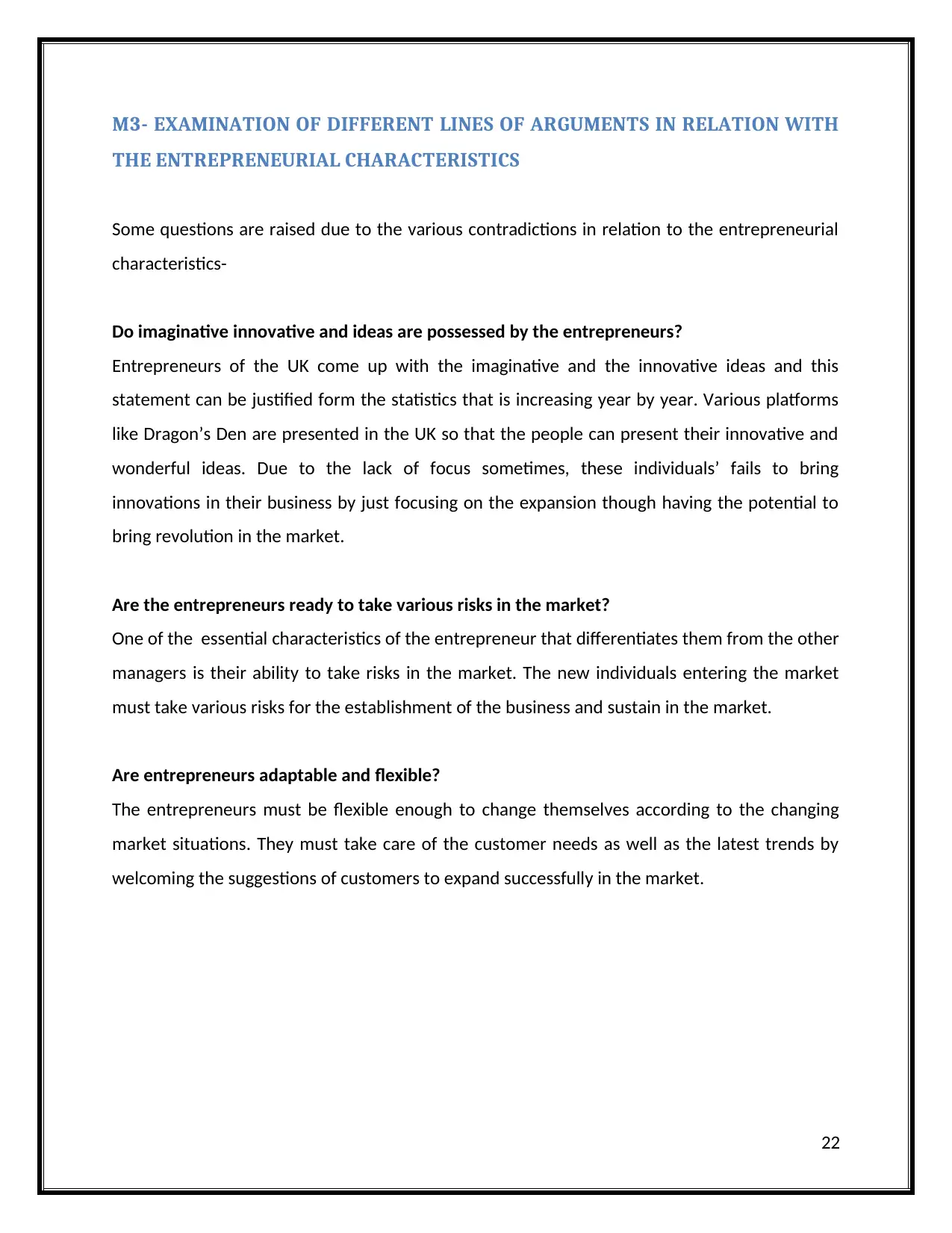
M3- EXAMINATION OF DIFFERENT LINES OF ARGUMENTS IN RELATION WITH
THE ENTREPRENEURIAL CHARACTERISTICS
Some questions are raised due to the various contradictions in relation to the entrepreneurial
characteristics-
Do imaginative innovative and ideas are possessed by the entrepreneurs?
Entrepreneurs of the UK come up with the imaginative and the innovative ideas and this
statement can be justified form the statistics that is increasing year by year. Various platforms
like Dragon’s Den are presented in the UK so that the people can present their innovative and
wonderful ideas. Due to the lack of focus sometimes, these individuals’ fails to bring
innovations in their business by just focusing on the expansion though having the potential to
bring revolution in the market.
Are the entrepreneurs ready to take various risks in the market?
One of the essential characteristics of the entrepreneur that differentiates them from the other
managers is their ability to take risks in the market. The new individuals entering the market
must take various risks for the establishment of the business and sustain in the market.
Are entrepreneurs adaptable and flexible?
The entrepreneurs must be flexible enough to change themselves according to the changing
market situations. They must take care of the customer needs as well as the latest trends by
welcoming the suggestions of customers to expand successfully in the market.
22
THE ENTREPRENEURIAL CHARACTERISTICS
Some questions are raised due to the various contradictions in relation to the entrepreneurial
characteristics-
Do imaginative innovative and ideas are possessed by the entrepreneurs?
Entrepreneurs of the UK come up with the imaginative and the innovative ideas and this
statement can be justified form the statistics that is increasing year by year. Various platforms
like Dragon’s Den are presented in the UK so that the people can present their innovative and
wonderful ideas. Due to the lack of focus sometimes, these individuals’ fails to bring
innovations in their business by just focusing on the expansion though having the potential to
bring revolution in the market.
Are the entrepreneurs ready to take various risks in the market?
One of the essential characteristics of the entrepreneur that differentiates them from the other
managers is their ability to take risks in the market. The new individuals entering the market
must take various risks for the establishment of the business and sustain in the market.
Are entrepreneurs adaptable and flexible?
The entrepreneurs must be flexible enough to change themselves according to the changing
market situations. They must take care of the customer needs as well as the latest trends by
welcoming the suggestions of customers to expand successfully in the market.
22
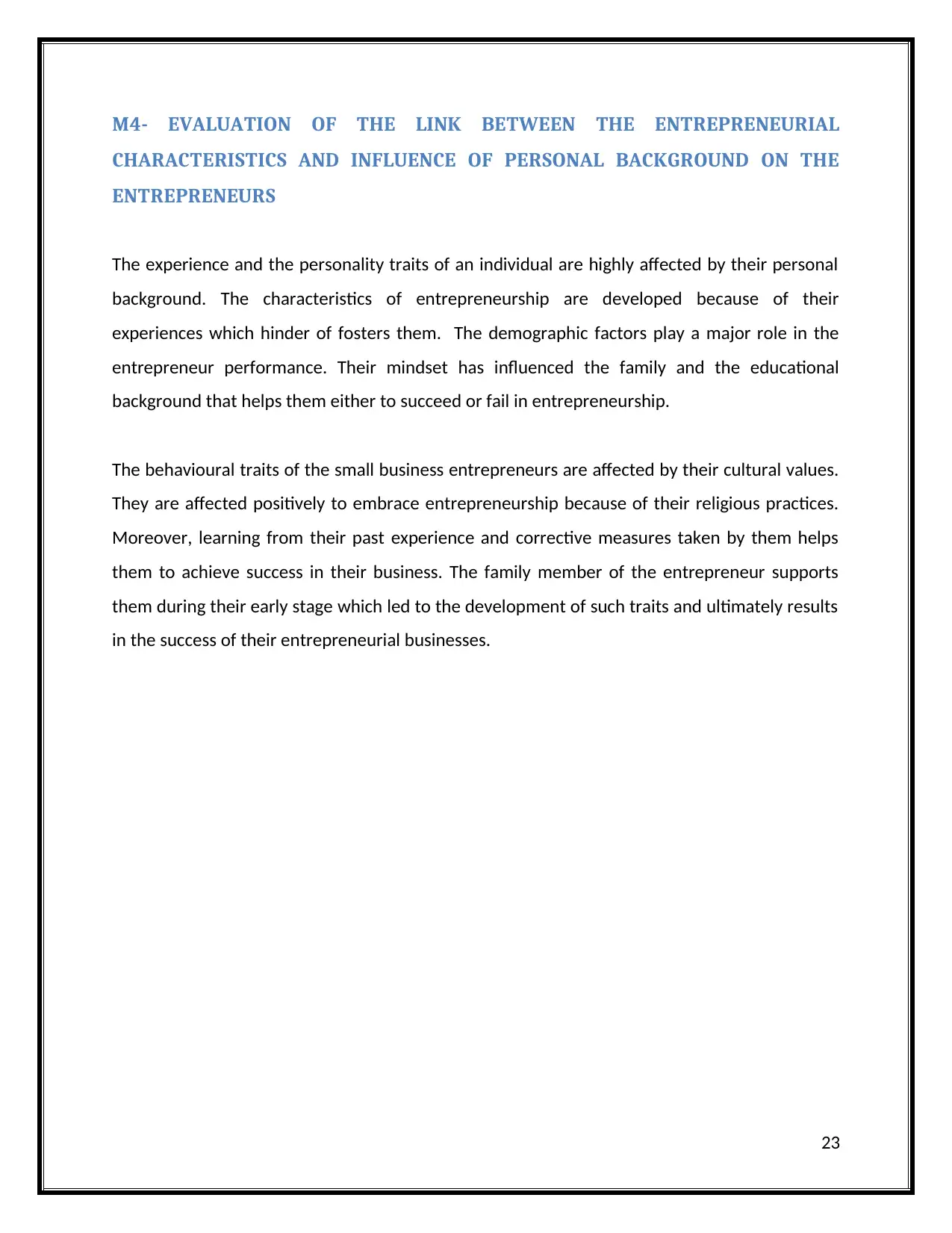
M4- EVALUATION OF THE LINK BETWEEN THE ENTREPRENEURIAL
CHARACTERISTICS AND INFLUENCE OF PERSONAL BACKGROUND ON THE
ENTREPRENEURS
The experience and the personality traits of an individual are highly affected by their personal
background. The characteristics of entrepreneurship are developed because of their
experiences which hinder of fosters them. The demographic factors play a major role in the
entrepreneur performance. Their mindset has influenced the family and the educational
background that helps them either to succeed or fail in entrepreneurship.
The behavioural traits of the small business entrepreneurs are affected by their cultural values.
They are affected positively to embrace entrepreneurship because of their religious practices.
Moreover, learning from their past experience and corrective measures taken by them helps
them to achieve success in their business. The family member of the entrepreneur supports
them during their early stage which led to the development of such traits and ultimately results
in the success of their entrepreneurial businesses.
23
CHARACTERISTICS AND INFLUENCE OF PERSONAL BACKGROUND ON THE
ENTREPRENEURS
The experience and the personality traits of an individual are highly affected by their personal
background. The characteristics of entrepreneurship are developed because of their
experiences which hinder of fosters them. The demographic factors play a major role in the
entrepreneur performance. Their mindset has influenced the family and the educational
background that helps them either to succeed or fail in entrepreneurship.
The behavioural traits of the small business entrepreneurs are affected by their cultural values.
They are affected positively to embrace entrepreneurship because of their religious practices.
Moreover, learning from their past experience and corrective measures taken by them helps
them to achieve success in their business. The family member of the entrepreneur supports
them during their early stage which led to the development of such traits and ultimately results
in the success of their entrepreneurial businesses.
23
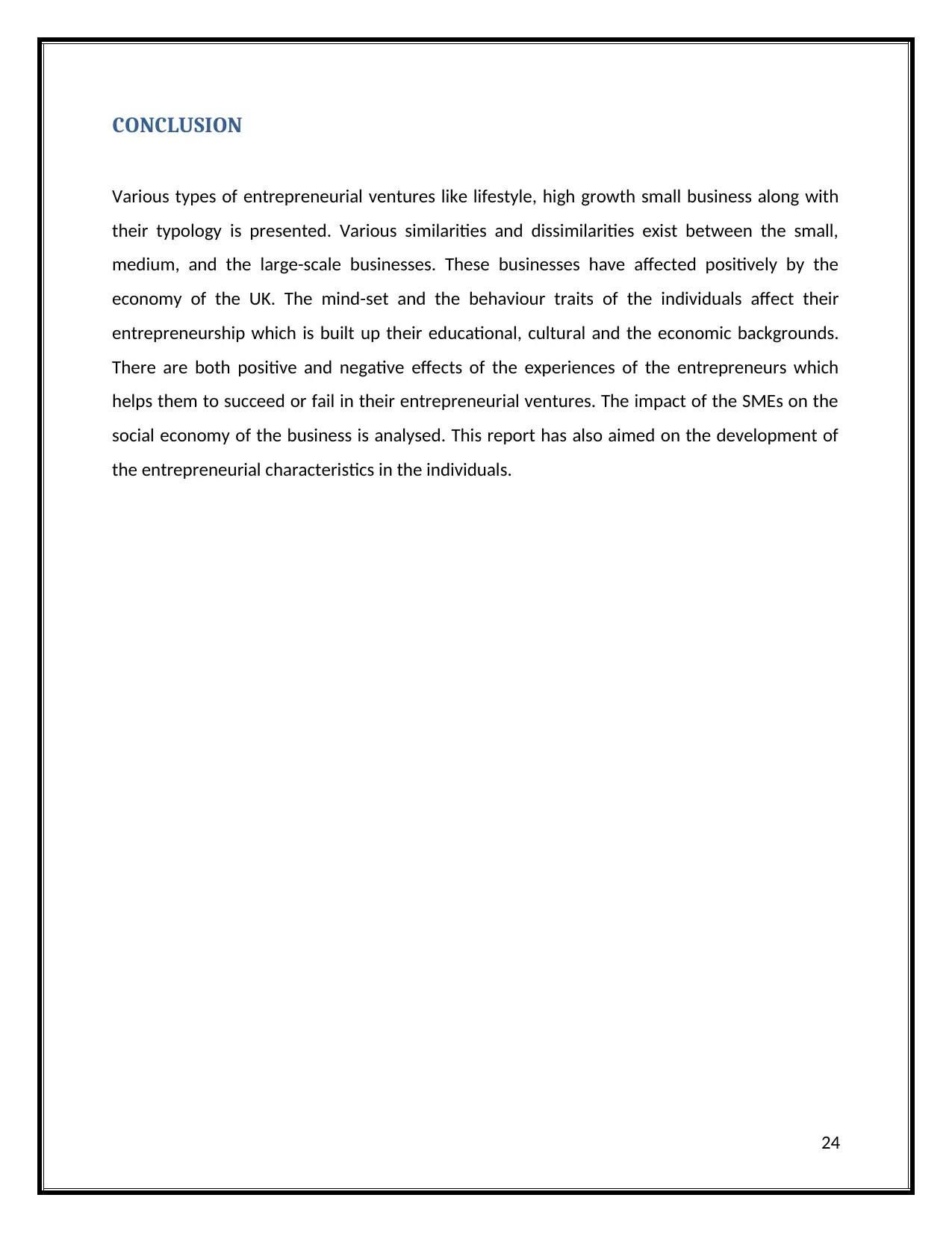
CONCLUSION
Various types of entrepreneurial ventures like lifestyle, high growth small business along with
their typology is presented. Various similarities and dissimilarities exist between the small,
medium, and the large-scale businesses. These businesses have affected positively by the
economy of the UK. The mind-set and the behaviour traits of the individuals affect their
entrepreneurship which is built up their educational, cultural and the economic backgrounds.
There are both positive and negative effects of the experiences of the entrepreneurs which
helps them to succeed or fail in their entrepreneurial ventures. The impact of the SMEs on the
social economy of the business is analysed. This report has also aimed on the development of
the entrepreneurial characteristics in the individuals.
24
Various types of entrepreneurial ventures like lifestyle, high growth small business along with
their typology is presented. Various similarities and dissimilarities exist between the small,
medium, and the large-scale businesses. These businesses have affected positively by the
economy of the UK. The mind-set and the behaviour traits of the individuals affect their
entrepreneurship which is built up their educational, cultural and the economic backgrounds.
There are both positive and negative effects of the experiences of the entrepreneurs which
helps them to succeed or fail in their entrepreneurial ventures. The impact of the SMEs on the
social economy of the business is analysed. This report has also aimed on the development of
the entrepreneurial characteristics in the individuals.
24
Paraphrase This Document
Need a fresh take? Get an instant paraphrase of this document with our AI Paraphraser
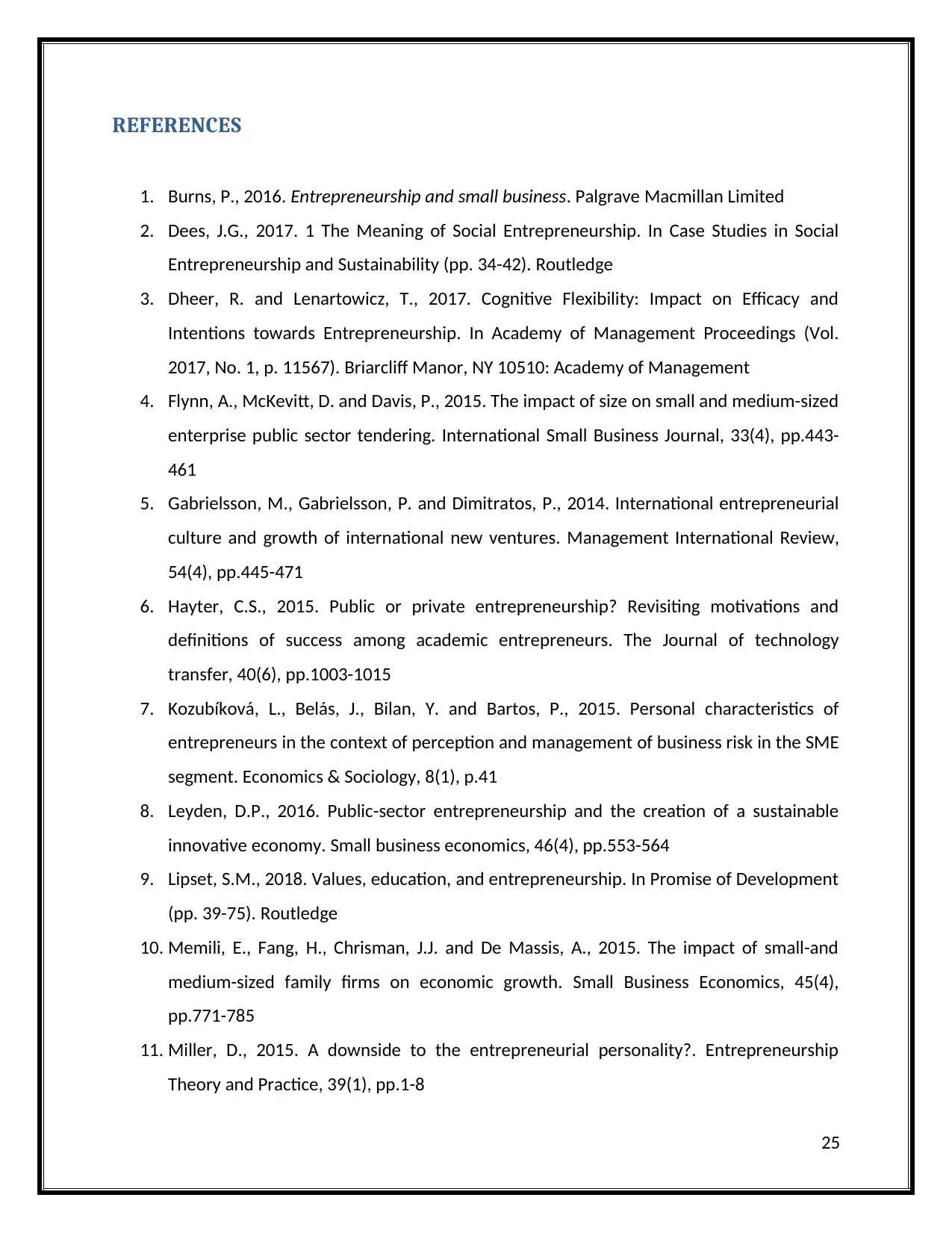
REFERENCES
1. Burns, P., 2016. Entrepreneurship and small business. Palgrave Macmillan Limited
2. Dees, J.G., 2017. 1 The Meaning of Social Entrepreneurship. In Case Studies in Social
Entrepreneurship and Sustainability (pp. 34-42). Routledge
3. Dheer, R. and Lenartowicz, T., 2017. Cognitive Flexibility: Impact on Efficacy and
Intentions towards Entrepreneurship. In Academy of Management Proceedings (Vol.
2017, No. 1, p. 11567). Briarcliff Manor, NY 10510: Academy of Management
4. Flynn, A., McKevitt, D. and Davis, P., 2015. The impact of size on small and medium-sized
enterprise public sector tendering. International Small Business Journal, 33(4), pp.443-
461
5. Gabrielsson, M., Gabrielsson, P. and Dimitratos, P., 2014. International entrepreneurial
culture and growth of international new ventures. Management International Review,
54(4), pp.445-471
6. Hayter, C.S., 2015. Public or private entrepreneurship? Revisiting motivations and
definitions of success among academic entrepreneurs. The Journal of technology
transfer, 40(6), pp.1003-1015
7. Kozubíková, L., Belás, J., Bilan, Y. and Bartos, P., 2015. Personal characteristics of
entrepreneurs in the context of perception and management of business risk in the SME
segment. Economics & Sociology, 8(1), p.41
8. Leyden, D.P., 2016. Public-sector entrepreneurship and the creation of a sustainable
innovative economy. Small business economics, 46(4), pp.553-564
9. Lipset, S.M., 2018. Values, education, and entrepreneurship. In Promise of Development
(pp. 39-75). Routledge
10. Memili, E., Fang, H., Chrisman, J.J. and De Massis, A., 2015. The impact of small-and
medium-sized family firms on economic growth. Small Business Economics, 45(4),
pp.771-785
11. Miller, D., 2015. A downside to the entrepreneurial personality?. Entrepreneurship
Theory and Practice, 39(1), pp.1-8
25
1. Burns, P., 2016. Entrepreneurship and small business. Palgrave Macmillan Limited
2. Dees, J.G., 2017. 1 The Meaning of Social Entrepreneurship. In Case Studies in Social
Entrepreneurship and Sustainability (pp. 34-42). Routledge
3. Dheer, R. and Lenartowicz, T., 2017. Cognitive Flexibility: Impact on Efficacy and
Intentions towards Entrepreneurship. In Academy of Management Proceedings (Vol.
2017, No. 1, p. 11567). Briarcliff Manor, NY 10510: Academy of Management
4. Flynn, A., McKevitt, D. and Davis, P., 2015. The impact of size on small and medium-sized
enterprise public sector tendering. International Small Business Journal, 33(4), pp.443-
461
5. Gabrielsson, M., Gabrielsson, P. and Dimitratos, P., 2014. International entrepreneurial
culture and growth of international new ventures. Management International Review,
54(4), pp.445-471
6. Hayter, C.S., 2015. Public or private entrepreneurship? Revisiting motivations and
definitions of success among academic entrepreneurs. The Journal of technology
transfer, 40(6), pp.1003-1015
7. Kozubíková, L., Belás, J., Bilan, Y. and Bartos, P., 2015. Personal characteristics of
entrepreneurs in the context of perception and management of business risk in the SME
segment. Economics & Sociology, 8(1), p.41
8. Leyden, D.P., 2016. Public-sector entrepreneurship and the creation of a sustainable
innovative economy. Small business economics, 46(4), pp.553-564
9. Lipset, S.M., 2018. Values, education, and entrepreneurship. In Promise of Development
(pp. 39-75). Routledge
10. Memili, E., Fang, H., Chrisman, J.J. and De Massis, A., 2015. The impact of small-and
medium-sized family firms on economic growth. Small Business Economics, 45(4),
pp.771-785
11. Miller, D., 2015. A downside to the entrepreneurial personality?. Entrepreneurship
Theory and Practice, 39(1), pp.1-8
25
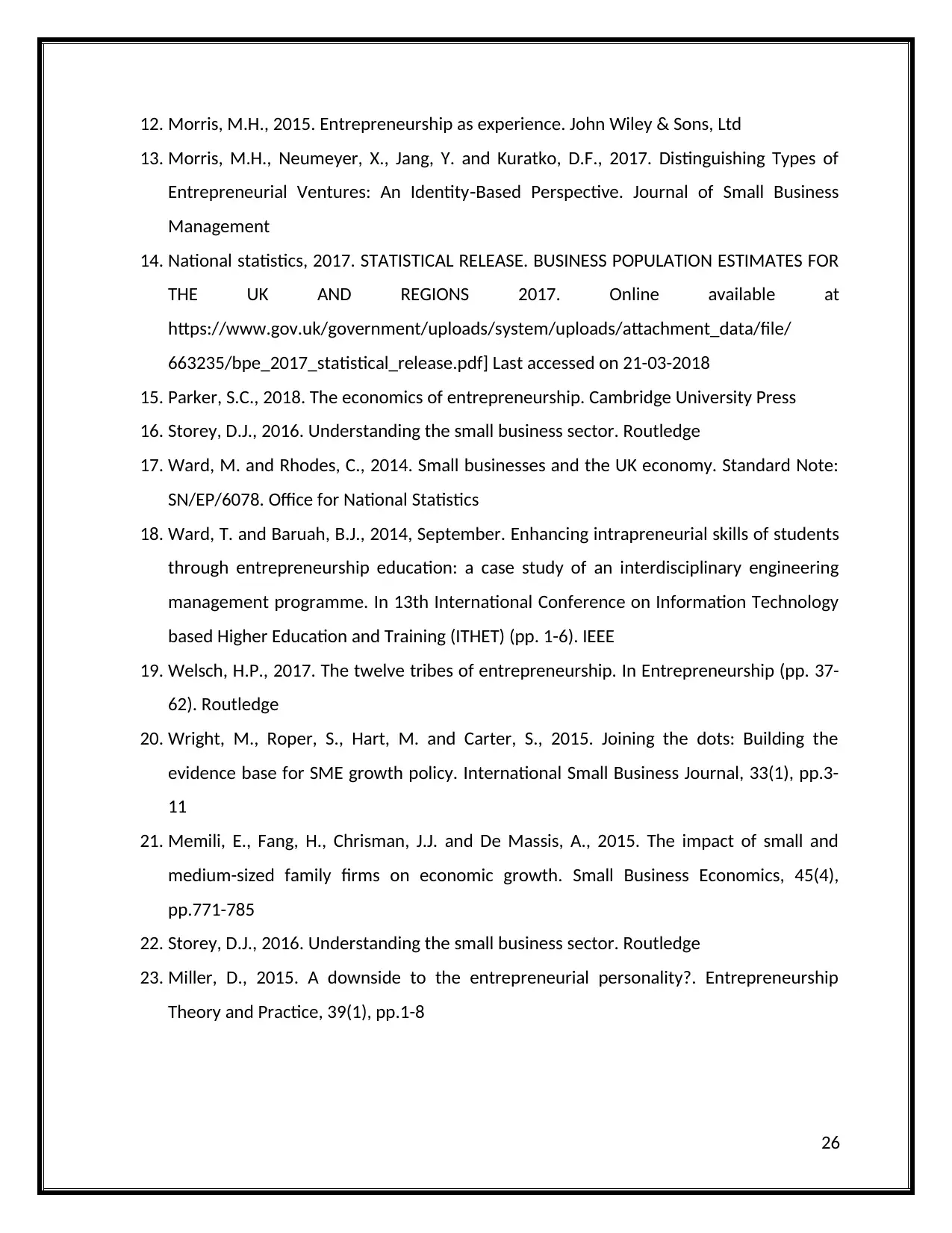
12. Morris, M.H., 2015. Entrepreneurship as experience. John Wiley & Sons, Ltd
13. Morris, M.H., Neumeyer, X., Jang, Y. and Kuratko, D.F., 2017. Distinguishing Types of
Entrepreneurial Ventures: An Identity Based Perspective. Journal of Small Business‐
Management
14. National statistics, 2017. STATISTICAL RELEASE. BUSINESS POPULATION ESTIMATES FOR
THE UK AND REGIONS 2017. Online available at
https://www.gov.uk/government/uploads/system/uploads/attachment_data/file/
663235/bpe_2017_statistical_release.pdf] Last accessed on 21-03-2018
15. Parker, S.C., 2018. The economics of entrepreneurship. Cambridge University Press
16. Storey, D.J., 2016. Understanding the small business sector. Routledge
17. Ward, M. and Rhodes, C., 2014. Small businesses and the UK economy. Standard Note:
SN/EP/6078. Office for National Statistics
18. Ward, T. and Baruah, B.J., 2014, September. Enhancing intrapreneurial skills of students
through entrepreneurship education: a case study of an interdisciplinary engineering
management programme. In 13th International Conference on Information Technology
based Higher Education and Training (ITHET) (pp. 1-6). IEEE
19. Welsch, H.P., 2017. The twelve tribes of entrepreneurship. In Entrepreneurship (pp. 37-
62). Routledge
20. Wright, M., Roper, S., Hart, M. and Carter, S., 2015. Joining the dots: Building the
evidence base for SME growth policy. International Small Business Journal, 33(1), pp.3-
11
21. Memili, E., Fang, H., Chrisman, J.J. and De Massis, A., 2015. The impact of small and
medium-sized family firms on economic growth. Small Business Economics, 45(4),
pp.771-785
22. Storey, D.J., 2016. Understanding the small business sector. Routledge
23. Miller, D., 2015. A downside to the entrepreneurial personality?. Entrepreneurship
Theory and Practice, 39(1), pp.1-8
26
13. Morris, M.H., Neumeyer, X., Jang, Y. and Kuratko, D.F., 2017. Distinguishing Types of
Entrepreneurial Ventures: An Identity Based Perspective. Journal of Small Business‐
Management
14. National statistics, 2017. STATISTICAL RELEASE. BUSINESS POPULATION ESTIMATES FOR
THE UK AND REGIONS 2017. Online available at
https://www.gov.uk/government/uploads/system/uploads/attachment_data/file/
663235/bpe_2017_statistical_release.pdf] Last accessed on 21-03-2018
15. Parker, S.C., 2018. The economics of entrepreneurship. Cambridge University Press
16. Storey, D.J., 2016. Understanding the small business sector. Routledge
17. Ward, M. and Rhodes, C., 2014. Small businesses and the UK economy. Standard Note:
SN/EP/6078. Office for National Statistics
18. Ward, T. and Baruah, B.J., 2014, September. Enhancing intrapreneurial skills of students
through entrepreneurship education: a case study of an interdisciplinary engineering
management programme. In 13th International Conference on Information Technology
based Higher Education and Training (ITHET) (pp. 1-6). IEEE
19. Welsch, H.P., 2017. The twelve tribes of entrepreneurship. In Entrepreneurship (pp. 37-
62). Routledge
20. Wright, M., Roper, S., Hart, M. and Carter, S., 2015. Joining the dots: Building the
evidence base for SME growth policy. International Small Business Journal, 33(1), pp.3-
11
21. Memili, E., Fang, H., Chrisman, J.J. and De Massis, A., 2015. The impact of small and
medium-sized family firms on economic growth. Small Business Economics, 45(4),
pp.771-785
22. Storey, D.J., 2016. Understanding the small business sector. Routledge
23. Miller, D., 2015. A downside to the entrepreneurial personality?. Entrepreneurship
Theory and Practice, 39(1), pp.1-8
26

24. Dheer, R. and Lenartowicz, T., 2017. Cognitive Flexibility: Impact on Efficacy and
Intentions towards Entrepreneurship. In Academy of Management Proceedings (Vol.
2017, No. 1, p. 11567). Briarcliff Manor, NY 10510: Academy of Management
27
Intentions towards Entrepreneurship. In Academy of Management Proceedings (Vol.
2017, No. 1, p. 11567). Briarcliff Manor, NY 10510: Academy of Management
27
Secure Best Marks with AI Grader
Need help grading? Try our AI Grader for instant feedback on your assignments.

28
1 out of 29
Related Documents
Your All-in-One AI-Powered Toolkit for Academic Success.
+13062052269
info@desklib.com
Available 24*7 on WhatsApp / Email
![[object Object]](/_next/static/media/star-bottom.7253800d.svg)
Unlock your academic potential
© 2024 | Zucol Services PVT LTD | All rights reserved.




